Growth of Delegated Legislation in India: A Doctrinal Analysis
VerifiedAdded on 2024/06/21
|19
|6185
|283
AI Summary
This research paper examines the growth of delegated legislation in India, exploring its historical development, constitutional framework, and the factors contributing to its expansion. It analyzes the technical, political, and administrative pressures that have led to the increasing reliance on delegated legislation, while also considering the potential challenges and limitations associated with this form of law-making. The study utilizes a doctrinal research approach, drawing upon primary sources such as case laws and statutes, as well as secondary sources like books and articles. It aims to provide a comprehensive understanding of the role of delegated legislation in the Indian legal system and its implications for the separation of powers, accountability, and the rule of law.
Contribute Materials
Your contribution can guide someone’s learning journey. Share your
documents today.

GROWTH OF DELEGATED LEGISLATION
Secure Best Marks with AI Grader
Need help grading? Try our AI Grader for instant feedback on your assignments.
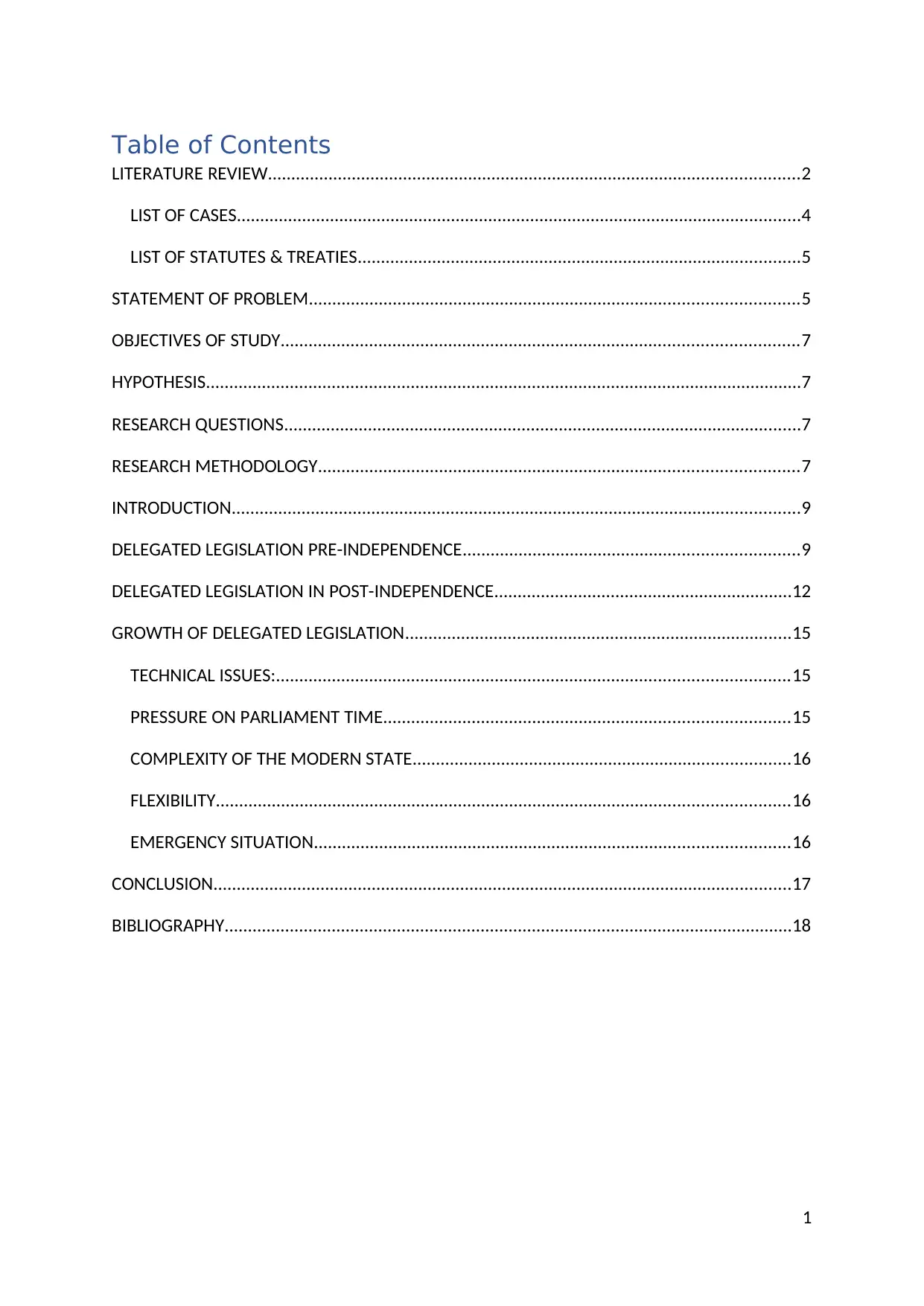
Table of Contents
LITERATURE REVIEW..................................................................................................................2
LIST OF CASES.........................................................................................................................4
LIST OF STATUTES & TREATIES...............................................................................................5
STATEMENT OF PROBLEM.........................................................................................................5
OBJECTIVES OF STUDY...............................................................................................................7
HYPOTHESIS................................................................................................................................7
RESEARCH QUESTIONS...............................................................................................................7
RESEARCH METHODOLOGY.......................................................................................................7
INTRODUCTION..........................................................................................................................9
DELEGATED LEGISLATION PRE-INDEPENDENCE........................................................................9
DELEGATED LEGISLATION IN POST-INDEPENDENCE................................................................12
GROWTH OF DELEGATED LEGISLATION...................................................................................15
TECHNICAL ISSUES:..............................................................................................................15
PRESSURE ON PARLIAMENT TIME.......................................................................................15
COMPLEXITY OF THE MODERN STATE.................................................................................16
FLEXIBILITY...........................................................................................................................16
EMERGENCY SITUATION......................................................................................................16
CONCLUSION............................................................................................................................17
BIBLIOGRAPHY..........................................................................................................................18
1
LITERATURE REVIEW..................................................................................................................2
LIST OF CASES.........................................................................................................................4
LIST OF STATUTES & TREATIES...............................................................................................5
STATEMENT OF PROBLEM.........................................................................................................5
OBJECTIVES OF STUDY...............................................................................................................7
HYPOTHESIS................................................................................................................................7
RESEARCH QUESTIONS...............................................................................................................7
RESEARCH METHODOLOGY.......................................................................................................7
INTRODUCTION..........................................................................................................................9
DELEGATED LEGISLATION PRE-INDEPENDENCE........................................................................9
DELEGATED LEGISLATION IN POST-INDEPENDENCE................................................................12
GROWTH OF DELEGATED LEGISLATION...................................................................................15
TECHNICAL ISSUES:..............................................................................................................15
PRESSURE ON PARLIAMENT TIME.......................................................................................15
COMPLEXITY OF THE MODERN STATE.................................................................................16
FLEXIBILITY...........................................................................................................................16
EMERGENCY SITUATION......................................................................................................16
CONCLUSION............................................................................................................................17
BIBLIOGRAPHY..........................................................................................................................18
1
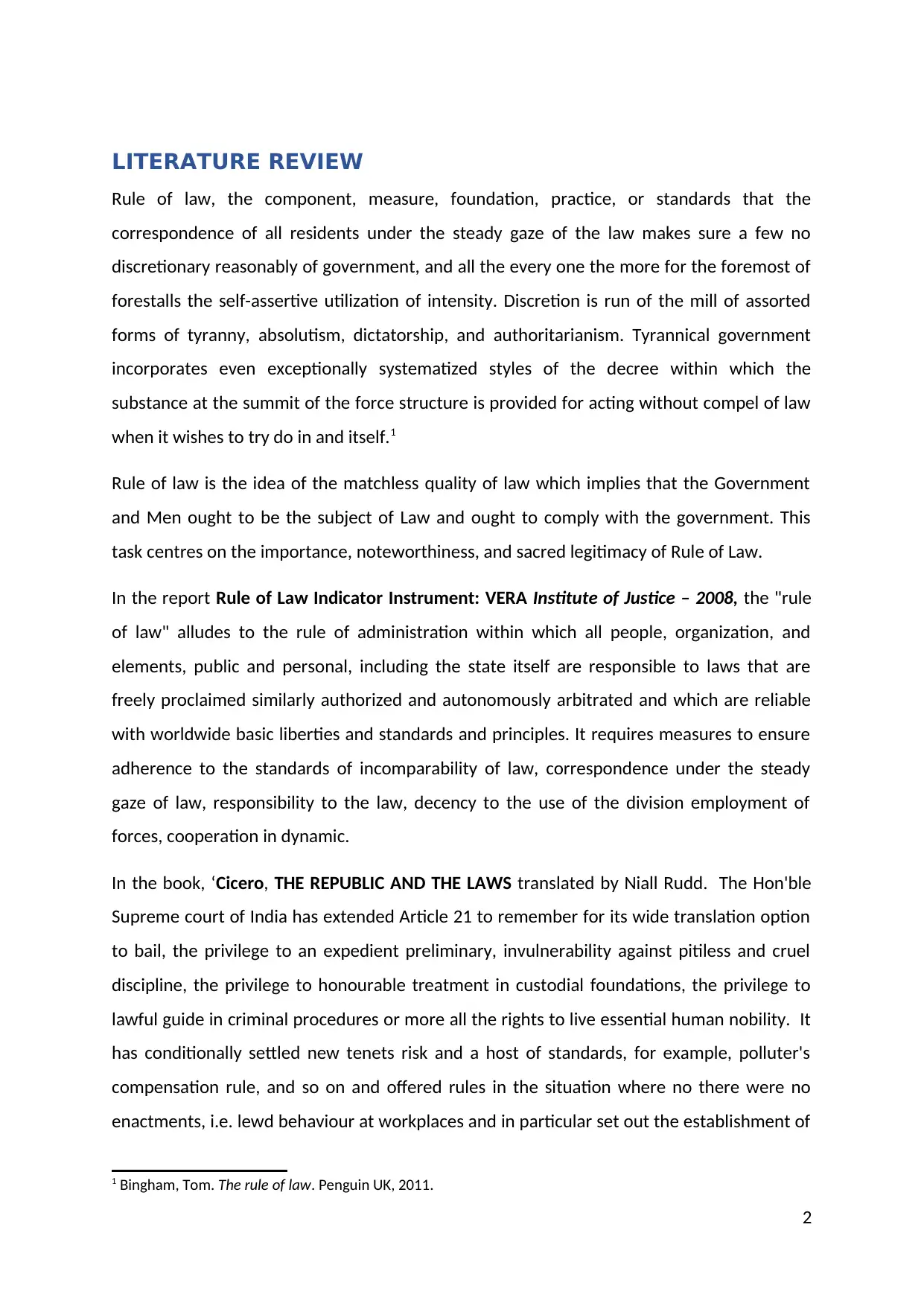
LITERATURE REVIEW
Rule of law, the component, measure, foundation, practice, or standards that the
correspondence of all residents under the steady gaze of the law makes sure a few no
discretionary reasonably of government, and all the every one the more for the foremost of
forestalls the self-assertive utilization of intensity. Discretion is run of the mill of assorted
forms of tyranny, absolutism, dictatorship, and authoritarianism. Tyrannical government
incorporates even exceptionally systematized styles of the decree within which the
substance at the summit of the force structure is provided for acting without compel of law
when it wishes to try do in and itself.1
Rule of law is the idea of the matchless quality of law which implies that the Government
and Men ought to be the subject of Law and ought to comply with the government. This
task centres on the importance, noteworthiness, and sacred legitimacy of Rule of Law.
In the report Rule of Law Indicator Instrument: VERA Institute of Justice – 2008, the "rule
of law" alludes to the rule of administration within which all people, organization, and
elements, public and personal, including the state itself are responsible to laws that are
freely proclaimed similarly authorized and autonomously arbitrated and which are reliable
with worldwide basic liberties and standards and principles. It requires measures to ensure
adherence to the standards of incomparability of law, correspondence under the steady
gaze of law, responsibility to the law, decency to the use of the division employment of
forces, cooperation in dynamic.
In the book, ‘Cicero, THE REPUBLIC AND THE LAWS translated by Niall Rudd. The Hon'ble
Supreme court of India has extended Article 21 to remember for its wide translation option
to bail, the privilege to an expedient preliminary, invulnerability against pitiless and cruel
discipline, the privilege to honourable treatment in custodial foundations, the privilege to
lawful guide in criminal procedures or more all the rights to live essential human nobility. It
has conditionally settled new tenets risk and a host of standards, for example, polluter's
compensation rule, and so on and offered rules in the situation where no there were no
enactments, i.e. lewd behaviour at workplaces and in particular set out the establishment of
1 Bingham, Tom. The rule of law. Penguin UK, 2011.
2
Rule of law, the component, measure, foundation, practice, or standards that the
correspondence of all residents under the steady gaze of the law makes sure a few no
discretionary reasonably of government, and all the every one the more for the foremost of
forestalls the self-assertive utilization of intensity. Discretion is run of the mill of assorted
forms of tyranny, absolutism, dictatorship, and authoritarianism. Tyrannical government
incorporates even exceptionally systematized styles of the decree within which the
substance at the summit of the force structure is provided for acting without compel of law
when it wishes to try do in and itself.1
Rule of law is the idea of the matchless quality of law which implies that the Government
and Men ought to be the subject of Law and ought to comply with the government. This
task centres on the importance, noteworthiness, and sacred legitimacy of Rule of Law.
In the report Rule of Law Indicator Instrument: VERA Institute of Justice – 2008, the "rule
of law" alludes to the rule of administration within which all people, organization, and
elements, public and personal, including the state itself are responsible to laws that are
freely proclaimed similarly authorized and autonomously arbitrated and which are reliable
with worldwide basic liberties and standards and principles. It requires measures to ensure
adherence to the standards of incomparability of law, correspondence under the steady
gaze of law, responsibility to the law, decency to the use of the division employment of
forces, cooperation in dynamic.
In the book, ‘Cicero, THE REPUBLIC AND THE LAWS translated by Niall Rudd. The Hon'ble
Supreme court of India has extended Article 21 to remember for its wide translation option
to bail, the privilege to an expedient preliminary, invulnerability against pitiless and cruel
discipline, the privilege to honourable treatment in custodial foundations, the privilege to
lawful guide in criminal procedures or more all the rights to live essential human nobility. It
has conditionally settled new tenets risk and a host of standards, for example, polluter's
compensation rule, and so on and offered rules in the situation where no there were no
enactments, i.e. lewd behaviour at workplaces and in particular set out the establishment of
1 Bingham, Tom. The rule of law. Penguin UK, 2011.
2
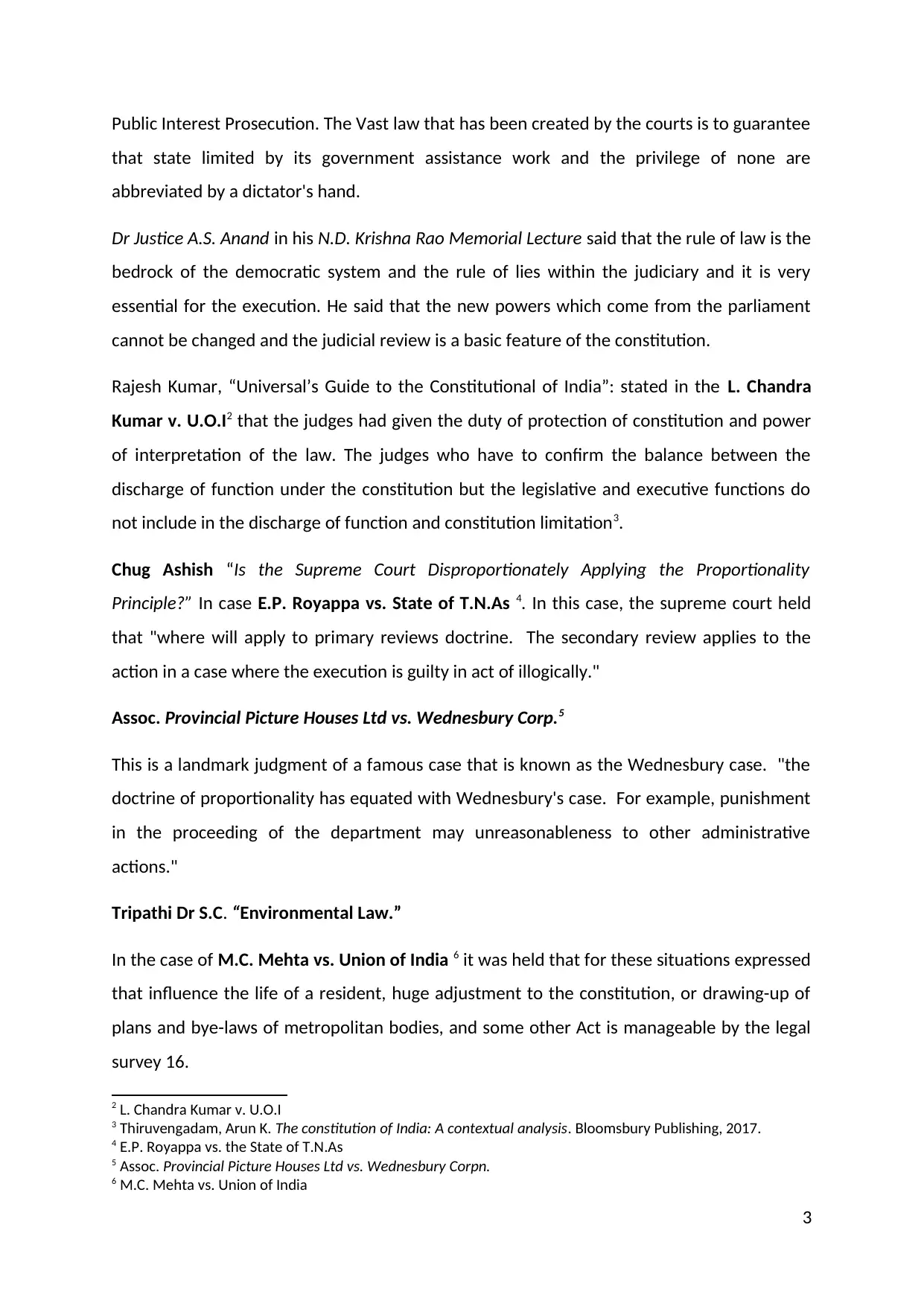
Public Interest Prosecution. The Vast law that has been created by the courts is to guarantee
that state limited by its government assistance work and the privilege of none are
abbreviated by a dictator's hand.
Dr Justice A.S. Anand in his N.D. Krishna Rao Memorial Lecture said that the rule of law is the
bedrock of the democratic system and the rule of lies within the judiciary and it is very
essential for the execution. He said that the new powers which come from the parliament
cannot be changed and the judicial review is a basic feature of the constitution.
Rajesh Kumar, “Universal’s Guide to the Constitutional of India”: stated in the L. Chandra
Kumar v. U.O.I2 that the judges had given the duty of protection of constitution and power
of interpretation of the law. The judges who have to confirm the balance between the
discharge of function under the constitution but the legislative and executive functions do
not include in the discharge of function and constitution limitation3.
Chug Ashish “Is the Supreme Court Disproportionately Applying the Proportionality
Principle?” In case E.P. Royappa vs. State of T.N.As 4. In this case, the supreme court held
that "where will apply to primary reviews doctrine. The secondary review applies to the
action in a case where the execution is guilty in act of illogically."
Assoc. Provincial Picture Houses Ltd vs. Wednesbury Corp.5
This is a landmark judgment of a famous case that is known as the Wednesbury case. "the
doctrine of proportionality has equated with Wednesbury's case. For example, punishment
in the proceeding of the department may unreasonableness to other administrative
actions."
Tripathi Dr S.C. “Environmental Law.”
In the case of M.C. Mehta vs. Union of India 6 it was held that for these situations expressed
that influence the life of a resident, huge adjustment to the constitution, or drawing-up of
plans and bye-laws of metropolitan bodies, and some other Act is manageable by the legal
survey 16.
2 L. Chandra Kumar v. U.O.I
3 Thiruvengadam, Arun K. The constitution of India: A contextual analysis. Bloomsbury Publishing, 2017.
4 E.P. Royappa vs. the State of T.N.As
5 Assoc. Provincial Picture Houses Ltd vs. Wednesbury Corpn.
6 M.C. Mehta vs. Union of India
3
that state limited by its government assistance work and the privilege of none are
abbreviated by a dictator's hand.
Dr Justice A.S. Anand in his N.D. Krishna Rao Memorial Lecture said that the rule of law is the
bedrock of the democratic system and the rule of lies within the judiciary and it is very
essential for the execution. He said that the new powers which come from the parliament
cannot be changed and the judicial review is a basic feature of the constitution.
Rajesh Kumar, “Universal’s Guide to the Constitutional of India”: stated in the L. Chandra
Kumar v. U.O.I2 that the judges had given the duty of protection of constitution and power
of interpretation of the law. The judges who have to confirm the balance between the
discharge of function under the constitution but the legislative and executive functions do
not include in the discharge of function and constitution limitation3.
Chug Ashish “Is the Supreme Court Disproportionately Applying the Proportionality
Principle?” In case E.P. Royappa vs. State of T.N.As 4. In this case, the supreme court held
that "where will apply to primary reviews doctrine. The secondary review applies to the
action in a case where the execution is guilty in act of illogically."
Assoc. Provincial Picture Houses Ltd vs. Wednesbury Corp.5
This is a landmark judgment of a famous case that is known as the Wednesbury case. "the
doctrine of proportionality has equated with Wednesbury's case. For example, punishment
in the proceeding of the department may unreasonableness to other administrative
actions."
Tripathi Dr S.C. “Environmental Law.”
In the case of M.C. Mehta vs. Union of India 6 it was held that for these situations expressed
that influence the life of a resident, huge adjustment to the constitution, or drawing-up of
plans and bye-laws of metropolitan bodies, and some other Act is manageable by the legal
survey 16.
2 L. Chandra Kumar v. U.O.I
3 Thiruvengadam, Arun K. The constitution of India: A contextual analysis. Bloomsbury Publishing, 2017.
4 E.P. Royappa vs. the State of T.N.As
5 Assoc. Provincial Picture Houses Ltd vs. Wednesbury Corpn.
6 M.C. Mehta vs. Union of India
3
Secure Best Marks with AI Grader
Need help grading? Try our AI Grader for instant feedback on your assignments.
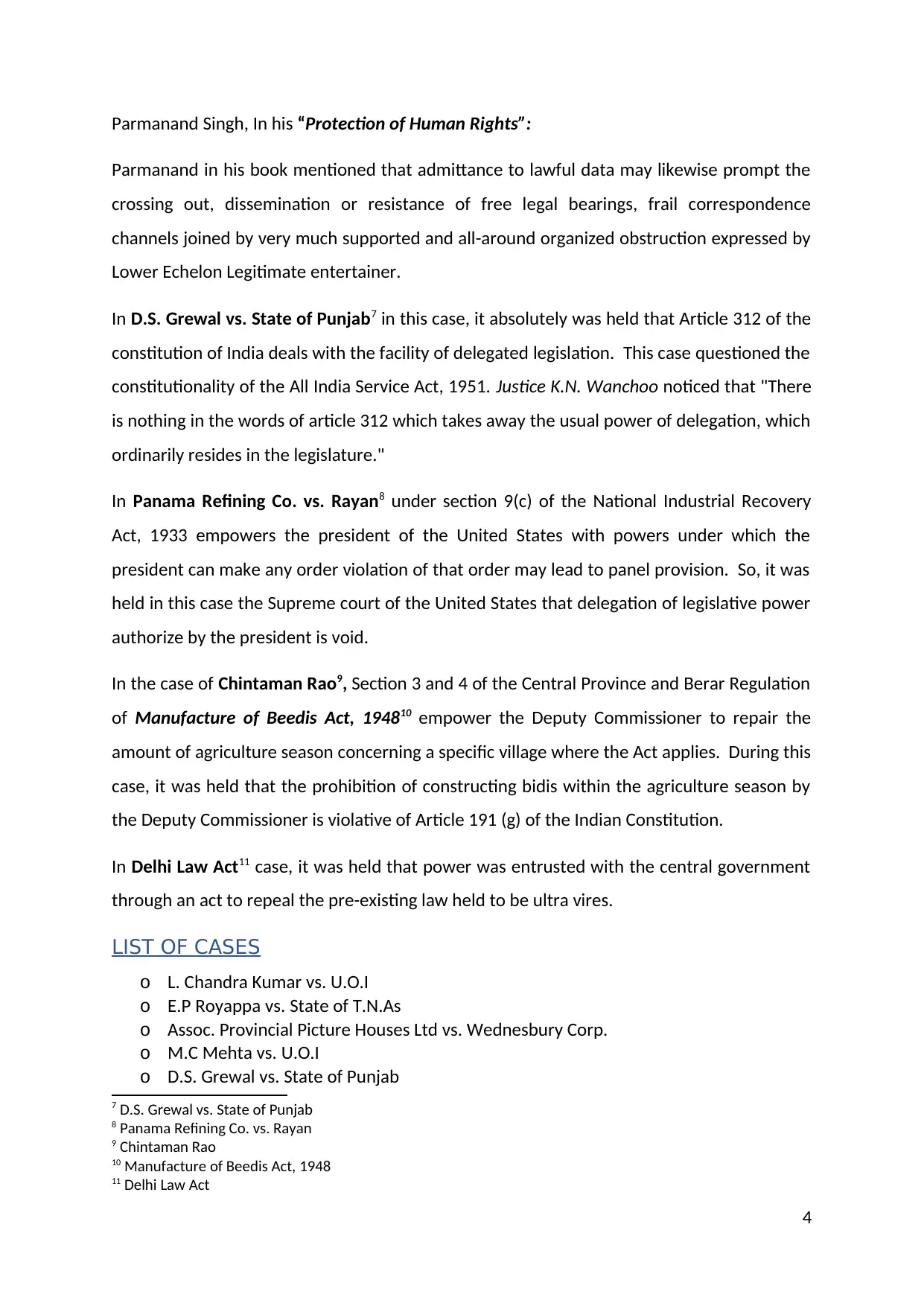
Parmanand Singh, In his “Protection of Human Rights”:
Parmanand in his book mentioned that admittance to lawful data may likewise prompt the
crossing out, dissemination or resistance of free legal bearings, frail correspondence
channels joined by very much supported and all-around organized obstruction expressed by
Lower Echelon Legitimate entertainer.
In D.S. Grewal vs. State of Punjab7 in this case, it absolutely was held that Article 312 of the
constitution of India deals with the facility of delegated legislation. This case questioned the
constitutionality of the All India Service Act, 1951. Justice K.N. Wanchoo noticed that "There
is nothing in the words of article 312 which takes away the usual power of delegation, which
ordinarily resides in the legislature."
In Panama Refining Co. vs. Rayan8 under section 9(c) of the National Industrial Recovery
Act, 1933 empowers the president of the United States with powers under which the
president can make any order violation of that order may lead to panel provision. So, it was
held in this case the Supreme court of the United States that delegation of legislative power
authorize by the president is void.
In the case of Chintaman Rao9, Section 3 and 4 of the Central Province and Berar Regulation
of Manufacture of Beedis Act, 194810 empower the Deputy Commissioner to repair the
amount of agriculture season concerning a specific village where the Act applies. During this
case, it was held that the prohibition of constructing bidis within the agriculture season by
the Deputy Commissioner is violative of Article 191 (g) of the Indian Constitution.
In Delhi Law Act11 case, it was held that power was entrusted with the central government
through an act to repeal the pre-existing law held to be ultra vires.
LIST OF CASES
o L. Chandra Kumar vs. U.O.I
o E.P Royappa vs. State of T.N.As
o Assoc. Provincial Picture Houses Ltd vs. Wednesbury Corp.
o M.C Mehta vs. U.O.I
o D.S. Grewal vs. State of Punjab
7 D.S. Grewal vs. State of Punjab
8 Panama Refining Co. vs. Rayan
9 Chintaman Rao
10 Manufacture of Beedis Act, 1948
11 Delhi Law Act
4
Parmanand in his book mentioned that admittance to lawful data may likewise prompt the
crossing out, dissemination or resistance of free legal bearings, frail correspondence
channels joined by very much supported and all-around organized obstruction expressed by
Lower Echelon Legitimate entertainer.
In D.S. Grewal vs. State of Punjab7 in this case, it absolutely was held that Article 312 of the
constitution of India deals with the facility of delegated legislation. This case questioned the
constitutionality of the All India Service Act, 1951. Justice K.N. Wanchoo noticed that "There
is nothing in the words of article 312 which takes away the usual power of delegation, which
ordinarily resides in the legislature."
In Panama Refining Co. vs. Rayan8 under section 9(c) of the National Industrial Recovery
Act, 1933 empowers the president of the United States with powers under which the
president can make any order violation of that order may lead to panel provision. So, it was
held in this case the Supreme court of the United States that delegation of legislative power
authorize by the president is void.
In the case of Chintaman Rao9, Section 3 and 4 of the Central Province and Berar Regulation
of Manufacture of Beedis Act, 194810 empower the Deputy Commissioner to repair the
amount of agriculture season concerning a specific village where the Act applies. During this
case, it was held that the prohibition of constructing bidis within the agriculture season by
the Deputy Commissioner is violative of Article 191 (g) of the Indian Constitution.
In Delhi Law Act11 case, it was held that power was entrusted with the central government
through an act to repeal the pre-existing law held to be ultra vires.
LIST OF CASES
o L. Chandra Kumar vs. U.O.I
o E.P Royappa vs. State of T.N.As
o Assoc. Provincial Picture Houses Ltd vs. Wednesbury Corp.
o M.C Mehta vs. U.O.I
o D.S. Grewal vs. State of Punjab
7 D.S. Grewal vs. State of Punjab
8 Panama Refining Co. vs. Rayan
9 Chintaman Rao
10 Manufacture of Beedis Act, 1948
11 Delhi Law Act
4
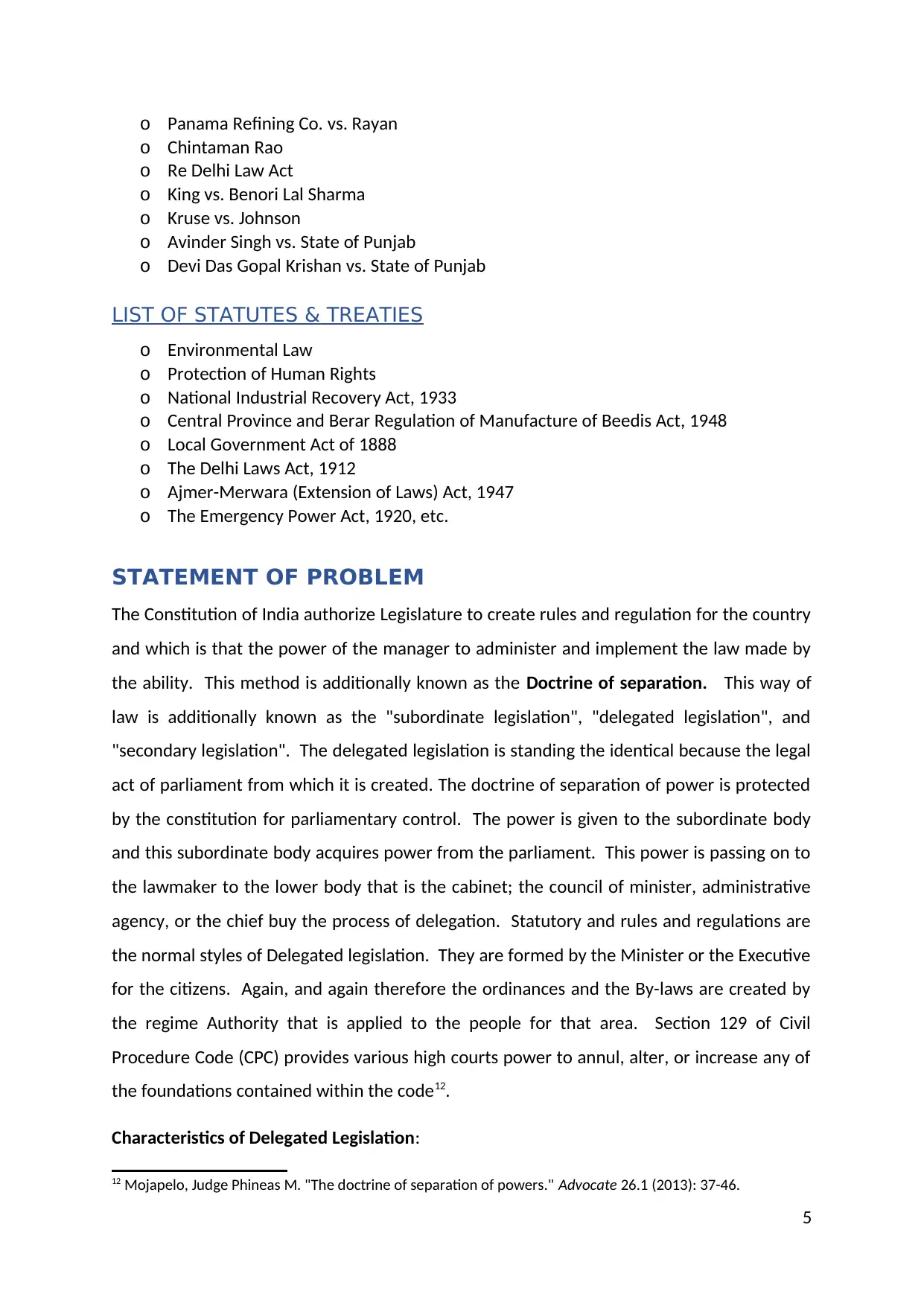
o Panama Refining Co. vs. Rayan
o Chintaman Rao
o Re Delhi Law Act
o King vs. Benori Lal Sharma
o Kruse vs. Johnson
o Avinder Singh vs. State of Punjab
o Devi Das Gopal Krishan vs. State of Punjab
LIST OF STATUTES & TREATIES
o Environmental Law
o Protection of Human Rights
o National Industrial Recovery Act, 1933
o Central Province and Berar Regulation of Manufacture of Beedis Act, 1948
o Local Government Act of 1888
o The Delhi Laws Act, 1912
o Ajmer-Merwara (Extension of Laws) Act, 1947
o The Emergency Power Act, 1920, etc.
STATEMENT OF PROBLEM
The Constitution of India authorize Legislature to create rules and regulation for the country
and which is that the power of the manager to administer and implement the law made by
the ability. This method is additionally known as the Doctrine of separation. This way of
law is additionally known as the "subordinate legislation", "delegated legislation", and
"secondary legislation". The delegated legislation is standing the identical because the legal
act of parliament from which it is created. The doctrine of separation of power is protected
by the constitution for parliamentary control. The power is given to the subordinate body
and this subordinate body acquires power from the parliament. This power is passing on to
the lawmaker to the lower body that is the cabinet; the council of minister, administrative
agency, or the chief buy the process of delegation. Statutory and rules and regulations are
the normal styles of Delegated legislation. They are formed by the Minister or the Executive
for the citizens. Again, and again therefore the ordinances and the By-laws are created by
the regime Authority that is applied to the people for that area. Section 129 of Civil
Procedure Code (CPC) provides various high courts power to annul, alter, or increase any of
the foundations contained within the code12.
Characteristics of Delegated Legislation:
12 Mojapelo, Judge Phineas M. "The doctrine of separation of powers." Advocate 26.1 (2013): 37-46.
5
o Chintaman Rao
o Re Delhi Law Act
o King vs. Benori Lal Sharma
o Kruse vs. Johnson
o Avinder Singh vs. State of Punjab
o Devi Das Gopal Krishan vs. State of Punjab
LIST OF STATUTES & TREATIES
o Environmental Law
o Protection of Human Rights
o National Industrial Recovery Act, 1933
o Central Province and Berar Regulation of Manufacture of Beedis Act, 1948
o Local Government Act of 1888
o The Delhi Laws Act, 1912
o Ajmer-Merwara (Extension of Laws) Act, 1947
o The Emergency Power Act, 1920, etc.
STATEMENT OF PROBLEM
The Constitution of India authorize Legislature to create rules and regulation for the country
and which is that the power of the manager to administer and implement the law made by
the ability. This method is additionally known as the Doctrine of separation. This way of
law is additionally known as the "subordinate legislation", "delegated legislation", and
"secondary legislation". The delegated legislation is standing the identical because the legal
act of parliament from which it is created. The doctrine of separation of power is protected
by the constitution for parliamentary control. The power is given to the subordinate body
and this subordinate body acquires power from the parliament. This power is passing on to
the lawmaker to the lower body that is the cabinet; the council of minister, administrative
agency, or the chief buy the process of delegation. Statutory and rules and regulations are
the normal styles of Delegated legislation. They are formed by the Minister or the Executive
for the citizens. Again, and again therefore the ordinances and the By-laws are created by
the regime Authority that is applied to the people for that area. Section 129 of Civil
Procedure Code (CPC) provides various high courts power to annul, alter, or increase any of
the foundations contained within the code12.
Characteristics of Delegated Legislation:
12 Mojapelo, Judge Phineas M. "The doctrine of separation of powers." Advocate 26.1 (2013): 37-46.
5
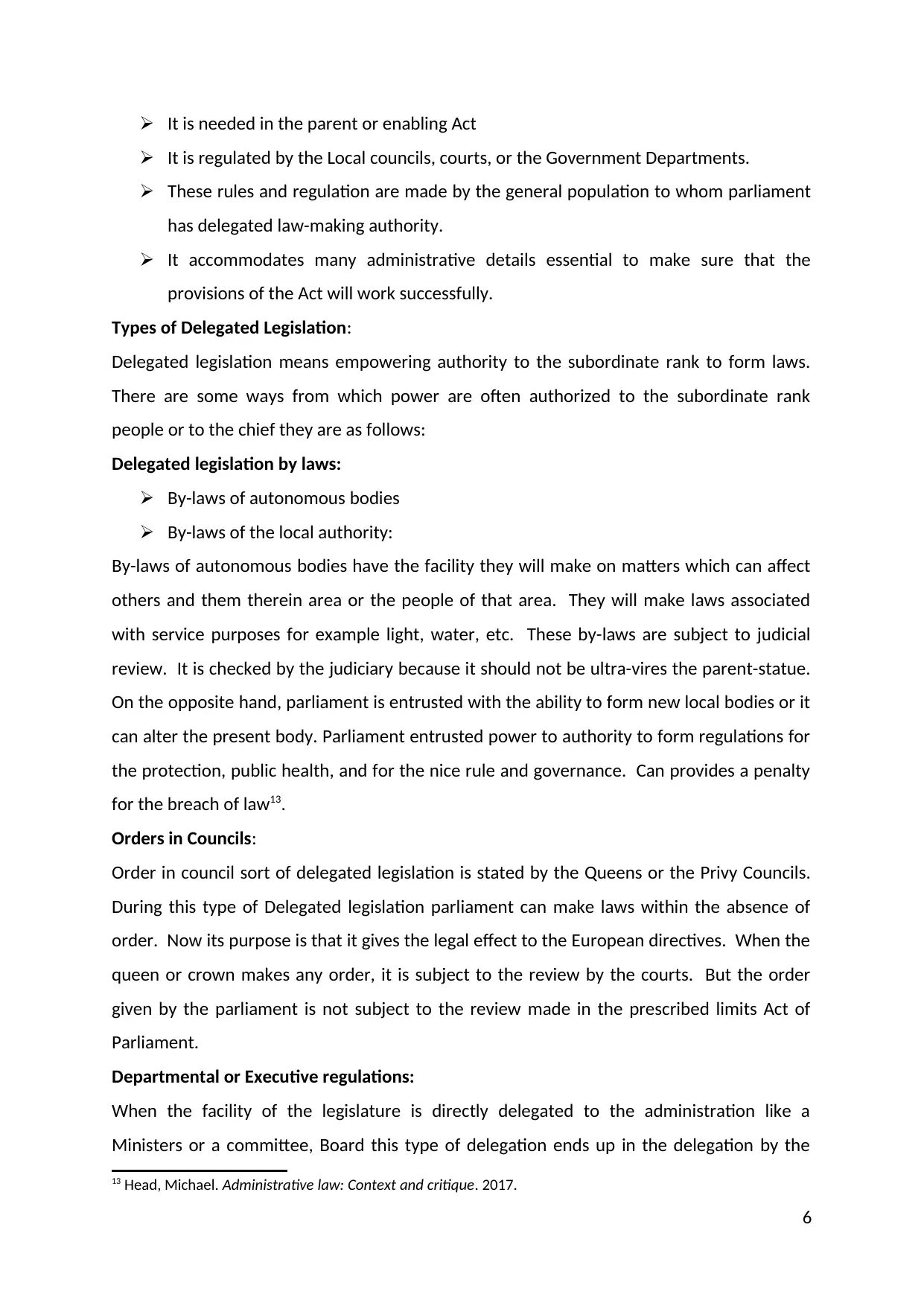
It is needed in the parent or enabling Act
It is regulated by the Local councils, courts, or the Government Departments.
These rules and regulation are made by the general population to whom parliament
has delegated law-making authority.
It accommodates many administrative details essential to make sure that the
provisions of the Act will work successfully.
Types of Delegated Legislation:
Delegated legislation means empowering authority to the subordinate rank to form laws.
There are some ways from which power are often authorized to the subordinate rank
people or to the chief they are as follows:
Delegated legislation by laws:
By-laws of autonomous bodies
By-laws of the local authority:
By-laws of autonomous bodies have the facility they will make on matters which can affect
others and them therein area or the people of that area. They will make laws associated
with service purposes for example light, water, etc. These by-laws are subject to judicial
review. It is checked by the judiciary because it should not be ultra-vires the parent-statue.
On the opposite hand, parliament is entrusted with the ability to form new local bodies or it
can alter the present body. Parliament entrusted power to authority to form regulations for
the protection, public health, and for the nice rule and governance. Can provides a penalty
for the breach of law13.
Orders in Councils:
Order in council sort of delegated legislation is stated by the Queens or the Privy Councils.
During this type of Delegated legislation parliament can make laws within the absence of
order. Now its purpose is that it gives the legal effect to the European directives. When the
queen or crown makes any order, it is subject to the review by the courts. But the order
given by the parliament is not subject to the review made in the prescribed limits Act of
Parliament.
Departmental or Executive regulations:
When the facility of the legislature is directly delegated to the administration like a
Ministers or a committee, Board this type of delegation ends up in the delegation by the
13 Head, Michael. Administrative law: Context and critique. 2017.
6
It is regulated by the Local councils, courts, or the Government Departments.
These rules and regulation are made by the general population to whom parliament
has delegated law-making authority.
It accommodates many administrative details essential to make sure that the
provisions of the Act will work successfully.
Types of Delegated Legislation:
Delegated legislation means empowering authority to the subordinate rank to form laws.
There are some ways from which power are often authorized to the subordinate rank
people or to the chief they are as follows:
Delegated legislation by laws:
By-laws of autonomous bodies
By-laws of the local authority:
By-laws of autonomous bodies have the facility they will make on matters which can affect
others and them therein area or the people of that area. They will make laws associated
with service purposes for example light, water, etc. These by-laws are subject to judicial
review. It is checked by the judiciary because it should not be ultra-vires the parent-statue.
On the opposite hand, parliament is entrusted with the ability to form new local bodies or it
can alter the present body. Parliament entrusted power to authority to form regulations for
the protection, public health, and for the nice rule and governance. Can provides a penalty
for the breach of law13.
Orders in Councils:
Order in council sort of delegated legislation is stated by the Queens or the Privy Councils.
During this type of Delegated legislation parliament can make laws within the absence of
order. Now its purpose is that it gives the legal effect to the European directives. When the
queen or crown makes any order, it is subject to the review by the courts. But the order
given by the parliament is not subject to the review made in the prescribed limits Act of
Parliament.
Departmental or Executive regulations:
When the facility of the legislature is directly delegated to the administration like a
Ministers or a committee, Board this type of delegation ends up in the delegation by the
13 Head, Michael. Administrative law: Context and critique. 2017.
6
Paraphrase This Document
Need a fresh take? Get an instant paraphrase of this document with our AI Paraphraser
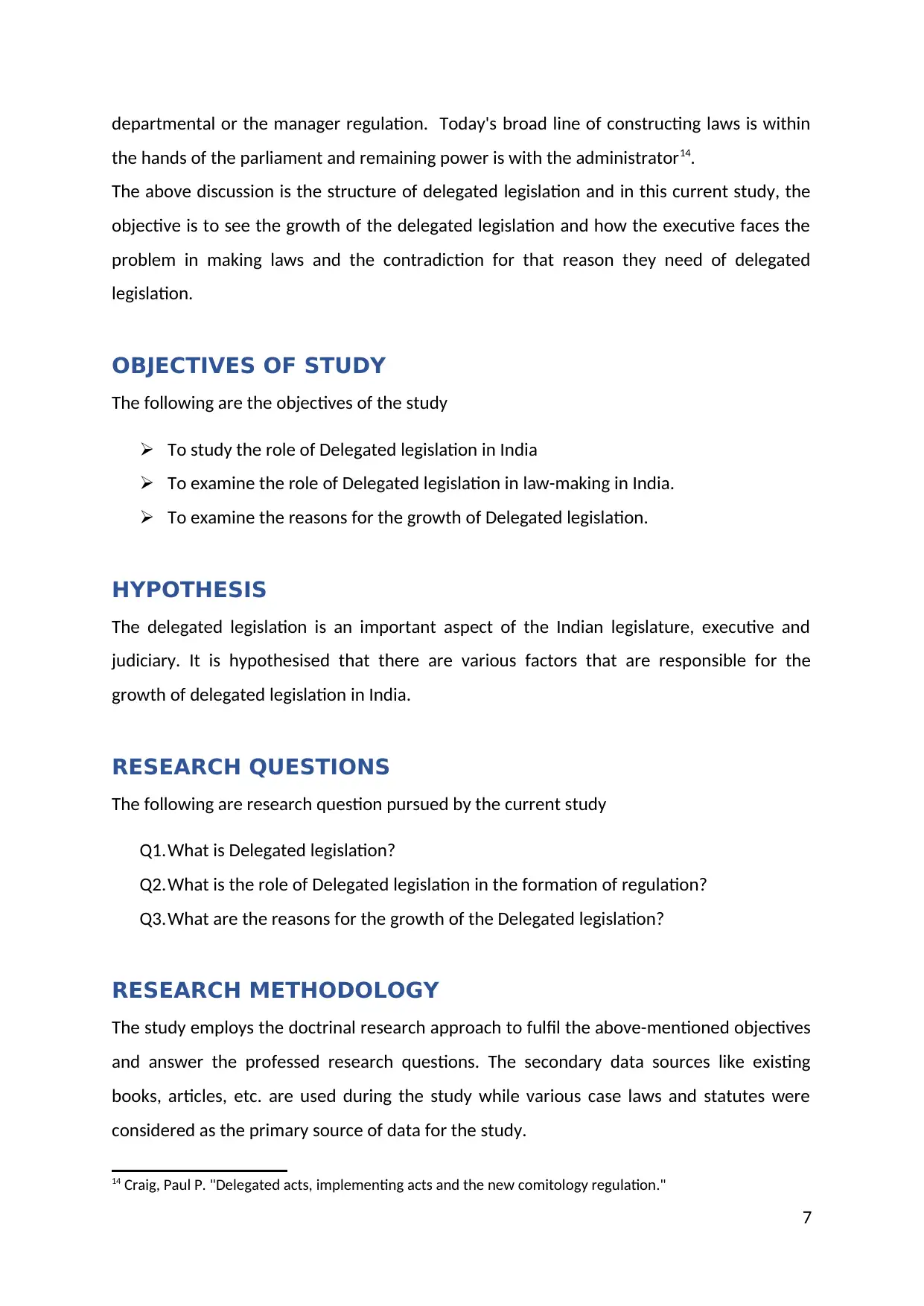
departmental or the manager regulation. Today's broad line of constructing laws is within
the hands of the parliament and remaining power is with the administrator14.
The above discussion is the structure of delegated legislation and in this current study, the
objective is to see the growth of the delegated legislation and how the executive faces the
problem in making laws and the contradiction for that reason they need of delegated
legislation.
OBJECTIVES OF STUDY
The following are the objectives of the study
To study the role of Delegated legislation in India
To examine the role of Delegated legislation in law-making in India.
To examine the reasons for the growth of Delegated legislation.
HYPOTHESIS
The delegated legislation is an important aspect of the Indian legislature, executive and
judiciary. It is hypothesised that there are various factors that are responsible for the
growth of delegated legislation in India.
RESEARCH QUESTIONS
The following are research question pursued by the current study
Q1.What is Delegated legislation?
Q2.What is the role of Delegated legislation in the formation of regulation?
Q3.What are the reasons for the growth of the Delegated legislation?
RESEARCH METHODOLOGY
The study employs the doctrinal research approach to fulfil the above-mentioned objectives
and answer the professed research questions. The secondary data sources like existing
books, articles, etc. are used during the study while various case laws and statutes were
considered as the primary source of data for the study.
14 Craig, Paul P. "Delegated acts, implementing acts and the new comitology regulation."
7
the hands of the parliament and remaining power is with the administrator14.
The above discussion is the structure of delegated legislation and in this current study, the
objective is to see the growth of the delegated legislation and how the executive faces the
problem in making laws and the contradiction for that reason they need of delegated
legislation.
OBJECTIVES OF STUDY
The following are the objectives of the study
To study the role of Delegated legislation in India
To examine the role of Delegated legislation in law-making in India.
To examine the reasons for the growth of Delegated legislation.
HYPOTHESIS
The delegated legislation is an important aspect of the Indian legislature, executive and
judiciary. It is hypothesised that there are various factors that are responsible for the
growth of delegated legislation in India.
RESEARCH QUESTIONS
The following are research question pursued by the current study
Q1.What is Delegated legislation?
Q2.What is the role of Delegated legislation in the formation of regulation?
Q3.What are the reasons for the growth of the Delegated legislation?
RESEARCH METHODOLOGY
The study employs the doctrinal research approach to fulfil the above-mentioned objectives
and answer the professed research questions. The secondary data sources like existing
books, articles, etc. are used during the study while various case laws and statutes were
considered as the primary source of data for the study.
14 Craig, Paul P. "Delegated acts, implementing acts and the new comitology regulation."
7

8
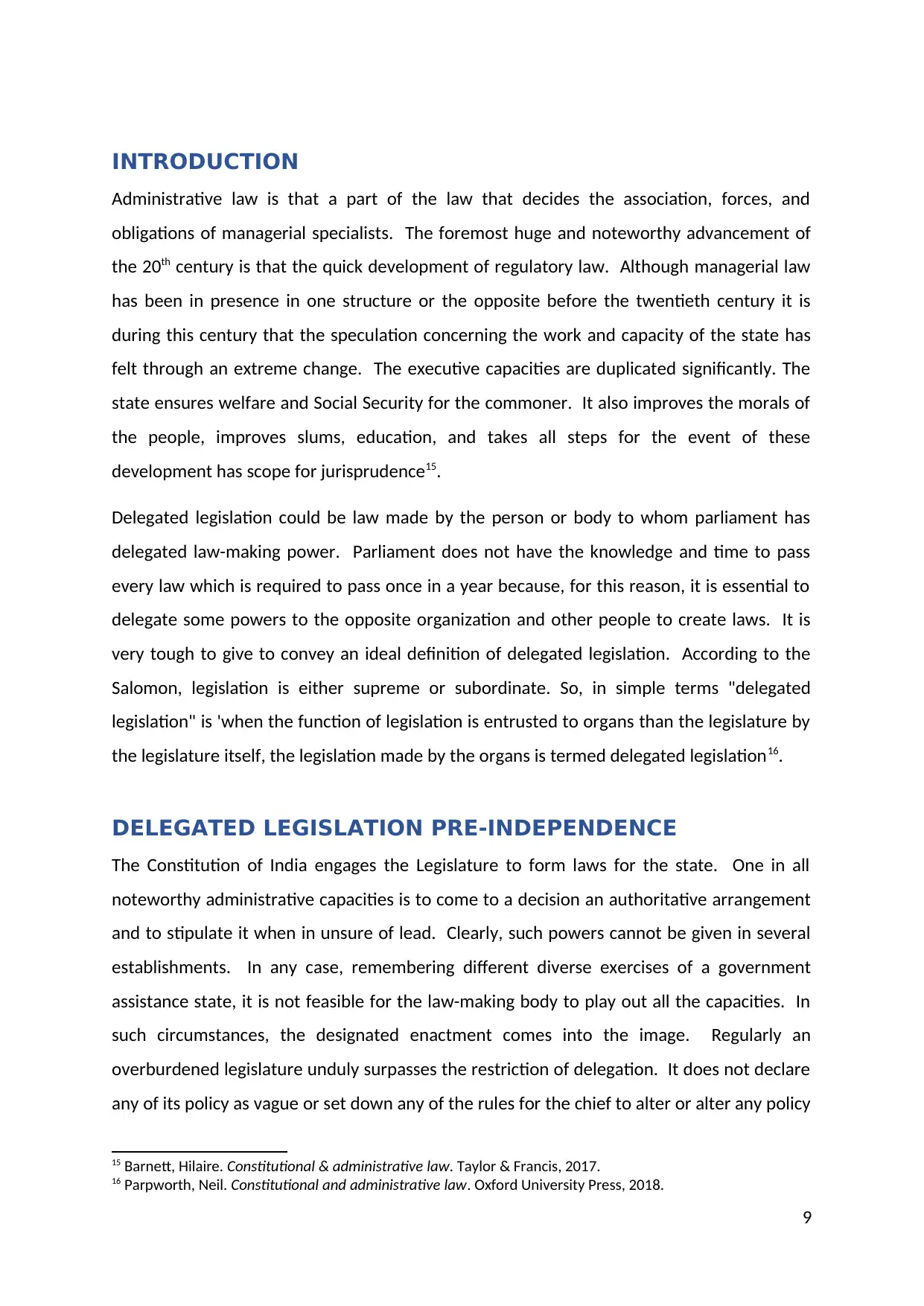
INTRODUCTION
Administrative law is that a part of the law that decides the association, forces, and
obligations of managerial specialists. The foremost huge and noteworthy advancement of
the 20th century is that the quick development of regulatory law. Although managerial law
has been in presence in one structure or the opposite before the twentieth century it is
during this century that the speculation concerning the work and capacity of the state has
felt through an extreme change. The executive capacities are duplicated significantly. The
state ensures welfare and Social Security for the commoner. It also improves the morals of
the people, improves slums, education, and takes all steps for the event of these
development has scope for jurisprudence15.
Delegated legislation could be law made by the person or body to whom parliament has
delegated law-making power. Parliament does not have the knowledge and time to pass
every law which is required to pass once in a year because, for this reason, it is essential to
delegate some powers to the opposite organization and other people to create laws. It is
very tough to give to convey an ideal definition of delegated legislation. According to the
Salomon, legislation is either supreme or subordinate. So, in simple terms "delegated
legislation" is 'when the function of legislation is entrusted to organs than the legislature by
the legislature itself, the legislation made by the organs is termed delegated legislation16.
DELEGATED LEGISLATION PRE-INDEPENDENCE
The Constitution of India engages the Legislature to form laws for the state. One in all
noteworthy administrative capacities is to come to a decision an authoritative arrangement
and to stipulate it when in unsure of lead. Clearly, such powers cannot be given in several
establishments. In any case, remembering different diverse exercises of a government
assistance state, it is not feasible for the law-making body to play out all the capacities. In
such circumstances, the designated enactment comes into the image. Regularly an
overburdened legislature unduly surpasses the restriction of delegation. It does not declare
any of its policy as vague or set down any of the rules for the chief to alter or alter any policy
15 Barnett, Hilaire. Constitutional & administrative law. Taylor & Francis, 2017.
16 Parpworth, Neil. Constitutional and administrative law. Oxford University Press, 2018.
9
Administrative law is that a part of the law that decides the association, forces, and
obligations of managerial specialists. The foremost huge and noteworthy advancement of
the 20th century is that the quick development of regulatory law. Although managerial law
has been in presence in one structure or the opposite before the twentieth century it is
during this century that the speculation concerning the work and capacity of the state has
felt through an extreme change. The executive capacities are duplicated significantly. The
state ensures welfare and Social Security for the commoner. It also improves the morals of
the people, improves slums, education, and takes all steps for the event of these
development has scope for jurisprudence15.
Delegated legislation could be law made by the person or body to whom parliament has
delegated law-making power. Parliament does not have the knowledge and time to pass
every law which is required to pass once in a year because, for this reason, it is essential to
delegate some powers to the opposite organization and other people to create laws. It is
very tough to give to convey an ideal definition of delegated legislation. According to the
Salomon, legislation is either supreme or subordinate. So, in simple terms "delegated
legislation" is 'when the function of legislation is entrusted to organs than the legislature by
the legislature itself, the legislation made by the organs is termed delegated legislation16.
DELEGATED LEGISLATION PRE-INDEPENDENCE
The Constitution of India engages the Legislature to form laws for the state. One in all
noteworthy administrative capacities is to come to a decision an authoritative arrangement
and to stipulate it when in unsure of lead. Clearly, such powers cannot be given in several
establishments. In any case, remembering different diverse exercises of a government
assistance state, it is not feasible for the law-making body to play out all the capacities. In
such circumstances, the designated enactment comes into the image. Regularly an
overburdened legislature unduly surpasses the restriction of delegation. It does not declare
any of its policy as vague or set down any of the rules for the chief to alter or alter any policy
15 Barnett, Hilaire. Constitutional & administrative law. Taylor & Francis, 2017.
16 Parpworth, Neil. Constitutional and administrative law. Oxford University Press, 2018.
9
Secure Best Marks with AI Grader
Need help grading? Try our AI Grader for instant feedback on your assignments.
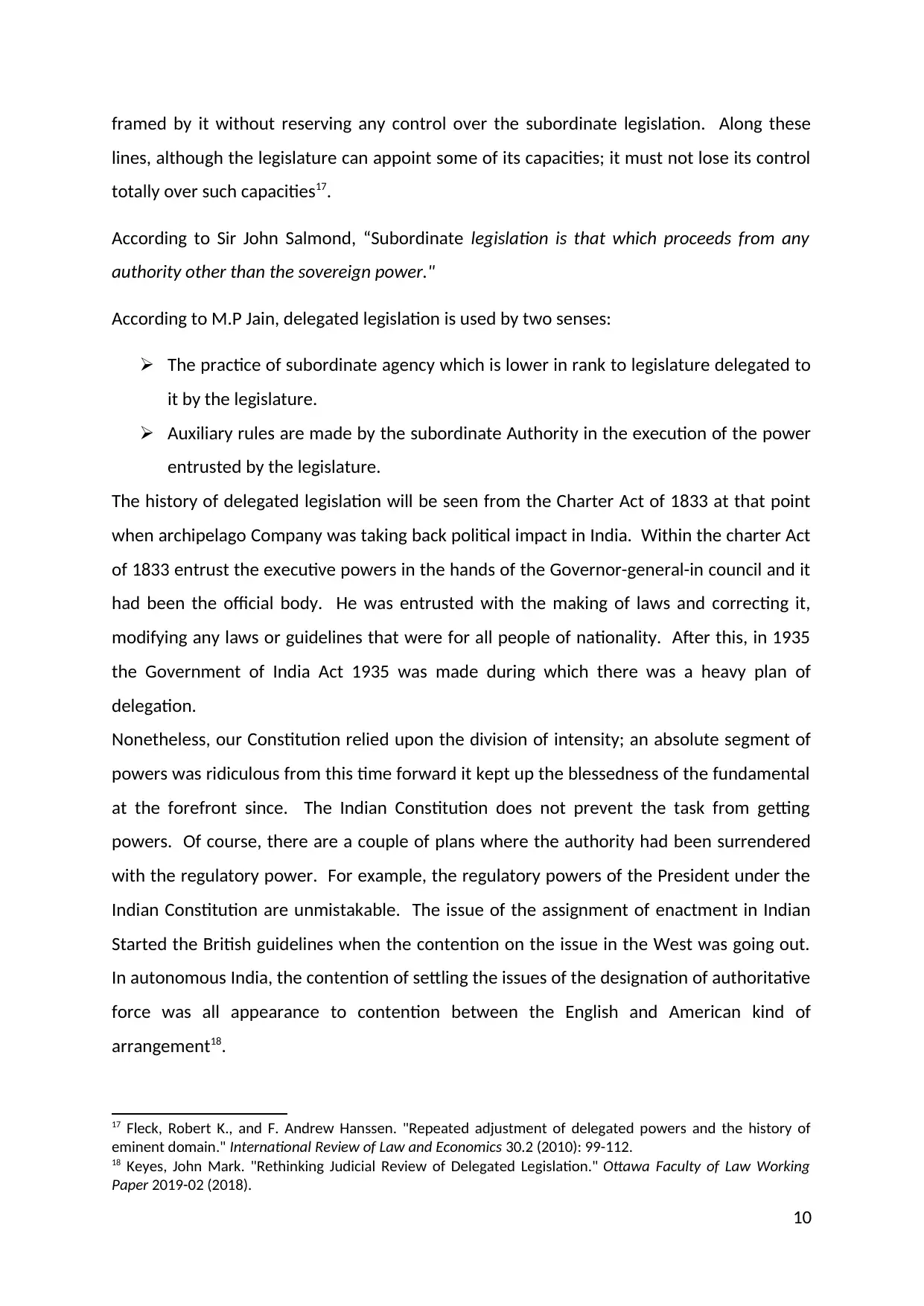
framed by it without reserving any control over the subordinate legislation. Along these
lines, although the legislature can appoint some of its capacities; it must not lose its control
totally over such capacities17.
According to Sir John Salmond, “Subordinate legislation is that which proceeds from any
authority other than the sovereign power."
According to M.P Jain, delegated legislation is used by two senses:
The practice of subordinate agency which is lower in rank to legislature delegated to
it by the legislature.
Auxiliary rules are made by the subordinate Authority in the execution of the power
entrusted by the legislature.
The history of delegated legislation will be seen from the Charter Act of 1833 at that point
when archipelago Company was taking back political impact in India. Within the charter Act
of 1833 entrust the executive powers in the hands of the Governor-general-in council and it
had been the official body. He was entrusted with the making of laws and correcting it,
modifying any laws or guidelines that were for all people of nationality. After this, in 1935
the Government of India Act 1935 was made during which there was a heavy plan of
delegation.
Nonetheless, our Constitution relied upon the division of intensity; an absolute segment of
powers was ridiculous from this time forward it kept up the blessedness of the fundamental
at the forefront since. The Indian Constitution does not prevent the task from getting
powers. Of course, there are a couple of plans where the authority had been surrendered
with the regulatory power. For example, the regulatory powers of the President under the
Indian Constitution are unmistakable. The issue of the assignment of enactment in Indian
Started the British guidelines when the contention on the issue in the West was going out.
In autonomous India, the contention of settling the issues of the designation of authoritative
force was all appearance to contention between the English and American kind of
arrangement18.
17 Fleck, Robert K., and F. Andrew Hanssen. "Repeated adjustment of delegated powers and the history of
eminent domain." International Review of Law and Economics 30.2 (2010): 99-112.
18 Keyes, John Mark. "Rethinking Judicial Review of Delegated Legislation." Ottawa Faculty of Law Working
Paper 2019-02 (2018).
10
lines, although the legislature can appoint some of its capacities; it must not lose its control
totally over such capacities17.
According to Sir John Salmond, “Subordinate legislation is that which proceeds from any
authority other than the sovereign power."
According to M.P Jain, delegated legislation is used by two senses:
The practice of subordinate agency which is lower in rank to legislature delegated to
it by the legislature.
Auxiliary rules are made by the subordinate Authority in the execution of the power
entrusted by the legislature.
The history of delegated legislation will be seen from the Charter Act of 1833 at that point
when archipelago Company was taking back political impact in India. Within the charter Act
of 1833 entrust the executive powers in the hands of the Governor-general-in council and it
had been the official body. He was entrusted with the making of laws and correcting it,
modifying any laws or guidelines that were for all people of nationality. After this, in 1935
the Government of India Act 1935 was made during which there was a heavy plan of
delegation.
Nonetheless, our Constitution relied upon the division of intensity; an absolute segment of
powers was ridiculous from this time forward it kept up the blessedness of the fundamental
at the forefront since. The Indian Constitution does not prevent the task from getting
powers. Of course, there are a couple of plans where the authority had been surrendered
with the regulatory power. For example, the regulatory powers of the President under the
Indian Constitution are unmistakable. The issue of the assignment of enactment in Indian
Started the British guidelines when the contention on the issue in the West was going out.
In autonomous India, the contention of settling the issues of the designation of authoritative
force was all appearance to contention between the English and American kind of
arrangement18.
17 Fleck, Robert K., and F. Andrew Hanssen. "Repeated adjustment of delegated powers and the history of
eminent domain." International Review of Law and Economics 30.2 (2010): 99-112.
18 Keyes, John Mark. "Rethinking Judicial Review of Delegated Legislation." Ottawa Faculty of Law Working
Paper 2019-02 (2018).
10
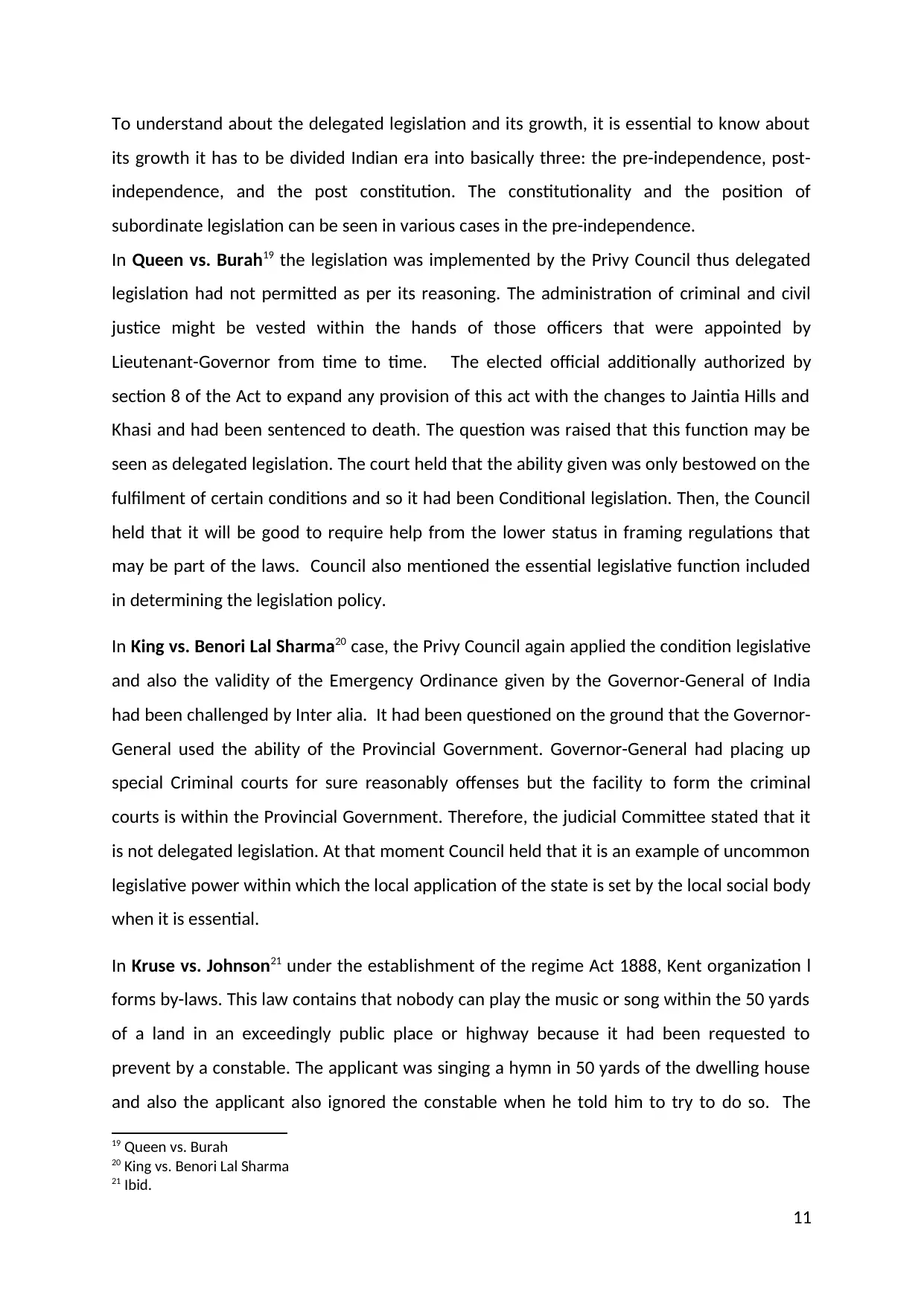
To understand about the delegated legislation and its growth, it is essential to know about
its growth it has to be divided Indian era into basically three: the pre-independence, post-
independence, and the post constitution. The constitutionality and the position of
subordinate legislation can be seen in various cases in the pre-independence.
In Queen vs. Burah19 the legislation was implemented by the Privy Council thus delegated
legislation had not permitted as per its reasoning. The administration of criminal and civil
justice might be vested within the hands of those officers that were appointed by
Lieutenant-Governor from time to time. The elected official additionally authorized by
section 8 of the Act to expand any provision of this act with the changes to Jaintia Hills and
Khasi and had been sentenced to death. The question was raised that this function may be
seen as delegated legislation. The court held that the ability given was only bestowed on the
fulfilment of certain conditions and so it had been Conditional legislation. Then, the Council
held that it will be good to require help from the lower status in framing regulations that
may be part of the laws. Council also mentioned the essential legislative function included
in determining the legislation policy.
In King vs. Benori Lal Sharma20 case, the Privy Council again applied the condition legislative
and also the validity of the Emergency Ordinance given by the Governor-General of India
had been challenged by Inter alia. It had been questioned on the ground that the Governor-
General used the ability of the Provincial Government. Governor-General had placing up
special Criminal courts for sure reasonably offenses but the facility to form the criminal
courts is within the Provincial Government. Therefore, the judicial Committee stated that it
is not delegated legislation. At that moment Council held that it is an example of uncommon
legislative power within which the local application of the state is set by the local social body
when it is essential.
In Kruse vs. Johnson21 under the establishment of the regime Act 1888, Kent organization l
forms by-laws. This law contains that nobody can play the music or song within the 50 yards
of a land in an exceedingly public place or highway because it had been requested to
prevent by a constable. The applicant was singing a hymn in 50 yards of the dwelling house
and also the applicant also ignored the constable when he told him to try to do so. The
19 Queen vs. Burah
20 King vs. Benori Lal Sharma
21 Ibid.
11
its growth it has to be divided Indian era into basically three: the pre-independence, post-
independence, and the post constitution. The constitutionality and the position of
subordinate legislation can be seen in various cases in the pre-independence.
In Queen vs. Burah19 the legislation was implemented by the Privy Council thus delegated
legislation had not permitted as per its reasoning. The administration of criminal and civil
justice might be vested within the hands of those officers that were appointed by
Lieutenant-Governor from time to time. The elected official additionally authorized by
section 8 of the Act to expand any provision of this act with the changes to Jaintia Hills and
Khasi and had been sentenced to death. The question was raised that this function may be
seen as delegated legislation. The court held that the ability given was only bestowed on the
fulfilment of certain conditions and so it had been Conditional legislation. Then, the Council
held that it will be good to require help from the lower status in framing regulations that
may be part of the laws. Council also mentioned the essential legislative function included
in determining the legislation policy.
In King vs. Benori Lal Sharma20 case, the Privy Council again applied the condition legislative
and also the validity of the Emergency Ordinance given by the Governor-General of India
had been challenged by Inter alia. It had been questioned on the ground that the Governor-
General used the ability of the Provincial Government. Governor-General had placing up
special Criminal courts for sure reasonably offenses but the facility to form the criminal
courts is within the Provincial Government. Therefore, the judicial Committee stated that it
is not delegated legislation. At that moment Council held that it is an example of uncommon
legislative power within which the local application of the state is set by the local social body
when it is essential.
In Kruse vs. Johnson21 under the establishment of the regime Act 1888, Kent organization l
forms by-laws. This law contains that nobody can play the music or song within the 50 yards
of a land in an exceedingly public place or highway because it had been requested to
prevent by a constable. The applicant was singing a hymn in 50 yards of the dwelling house
and also the applicant also ignored the constable when he told him to try to do so. The
19 Queen vs. Burah
20 King vs. Benori Lal Sharma
21 Ibid.
11
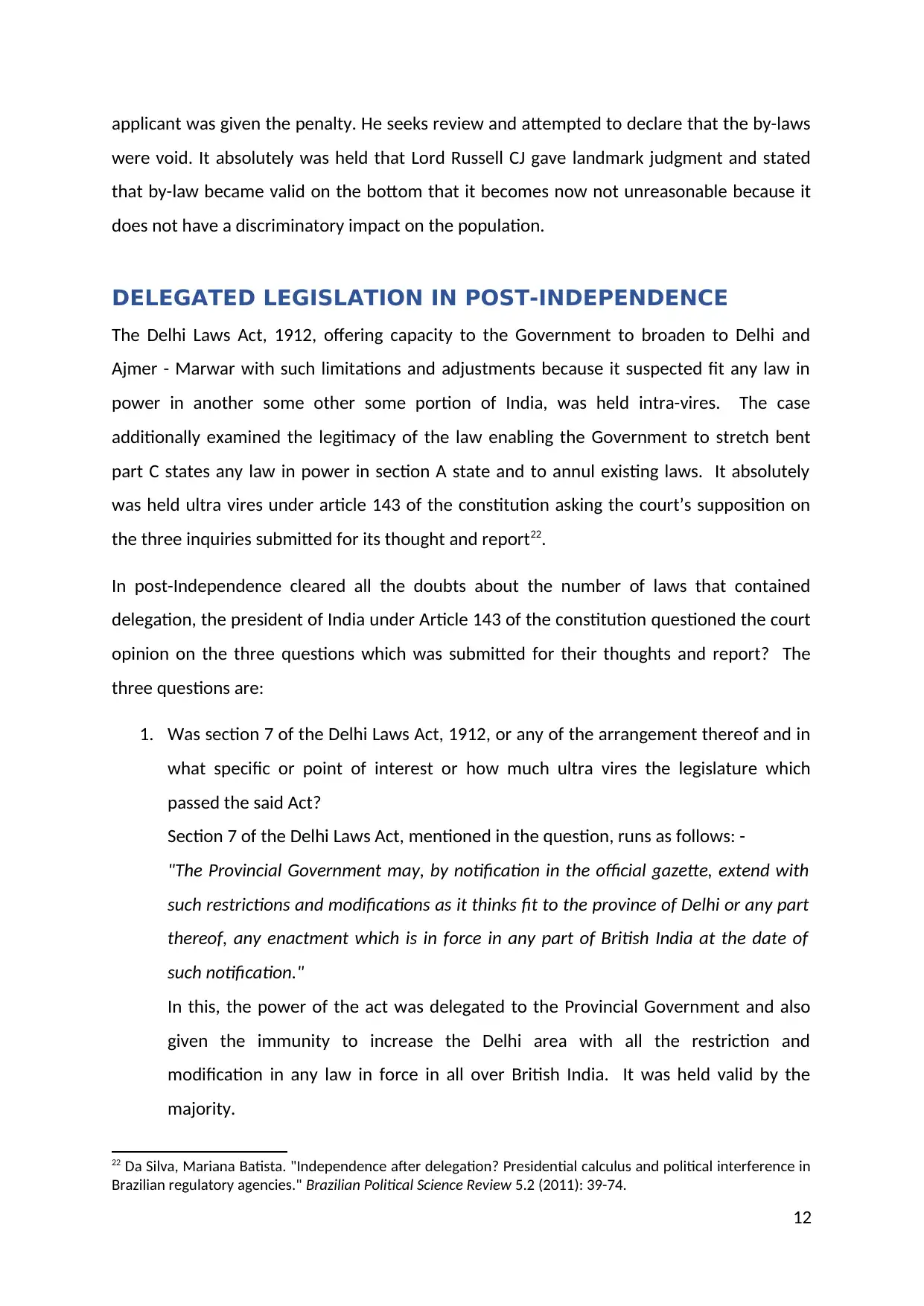
applicant was given the penalty. He seeks review and attempted to declare that the by-laws
were void. It absolutely was held that Lord Russell CJ gave landmark judgment and stated
that by-law became valid on the bottom that it becomes now not unreasonable because it
does not have a discriminatory impact on the population.
DELEGATED LEGISLATION IN POST-INDEPENDENCE
The Delhi Laws Act, 1912, offering capacity to the Government to broaden to Delhi and
Ajmer - Marwar with such limitations and adjustments because it suspected fit any law in
power in another some other some portion of India, was held intra-vires. The case
additionally examined the legitimacy of the law enabling the Government to stretch bent
part C states any law in power in section A state and to annul existing laws. It absolutely
was held ultra vires under article 143 of the constitution asking the court’s supposition on
the three inquiries submitted for its thought and report22.
In post-Independence cleared all the doubts about the number of laws that contained
delegation, the president of India under Article 143 of the constitution questioned the court
opinion on the three questions which was submitted for their thoughts and report? The
three questions are:
1. Was section 7 of the Delhi Laws Act, 1912, or any of the arrangement thereof and in
what specific or point of interest or how much ultra vires the legislature which
passed the said Act?
Section 7 of the Delhi Laws Act, mentioned in the question, runs as follows: -
"The Provincial Government may, by notification in the official gazette, extend with
such restrictions and modifications as it thinks fit to the province of Delhi or any part
thereof, any enactment which is in force in any part of British India at the date of
such notification."
In this, the power of the act was delegated to the Provincial Government and also
given the immunity to increase the Delhi area with all the restriction and
modification in any law in force in all over British India. It was held valid by the
majority.
22 Da Silva, Mariana Batista. "Independence after delegation? Presidential calculus and political interference in
Brazilian regulatory agencies." Brazilian Political Science Review 5.2 (2011): 39-74.
12
were void. It absolutely was held that Lord Russell CJ gave landmark judgment and stated
that by-law became valid on the bottom that it becomes now not unreasonable because it
does not have a discriminatory impact on the population.
DELEGATED LEGISLATION IN POST-INDEPENDENCE
The Delhi Laws Act, 1912, offering capacity to the Government to broaden to Delhi and
Ajmer - Marwar with such limitations and adjustments because it suspected fit any law in
power in another some other some portion of India, was held intra-vires. The case
additionally examined the legitimacy of the law enabling the Government to stretch bent
part C states any law in power in section A state and to annul existing laws. It absolutely
was held ultra vires under article 143 of the constitution asking the court’s supposition on
the three inquiries submitted for its thought and report22.
In post-Independence cleared all the doubts about the number of laws that contained
delegation, the president of India under Article 143 of the constitution questioned the court
opinion on the three questions which was submitted for their thoughts and report? The
three questions are:
1. Was section 7 of the Delhi Laws Act, 1912, or any of the arrangement thereof and in
what specific or point of interest or how much ultra vires the legislature which
passed the said Act?
Section 7 of the Delhi Laws Act, mentioned in the question, runs as follows: -
"The Provincial Government may, by notification in the official gazette, extend with
such restrictions and modifications as it thinks fit to the province of Delhi or any part
thereof, any enactment which is in force in any part of British India at the date of
such notification."
In this, the power of the act was delegated to the Provincial Government and also
given the immunity to increase the Delhi area with all the restriction and
modification in any law in force in all over British India. It was held valid by the
majority.
22 Da Silva, Mariana Batista. "Independence after delegation? Presidential calculus and political interference in
Brazilian regulatory agencies." Brazilian Political Science Review 5.2 (2011): 39-74.
12
Paraphrase This Document
Need a fresh take? Get an instant paraphrase of this document with our AI Paraphraser
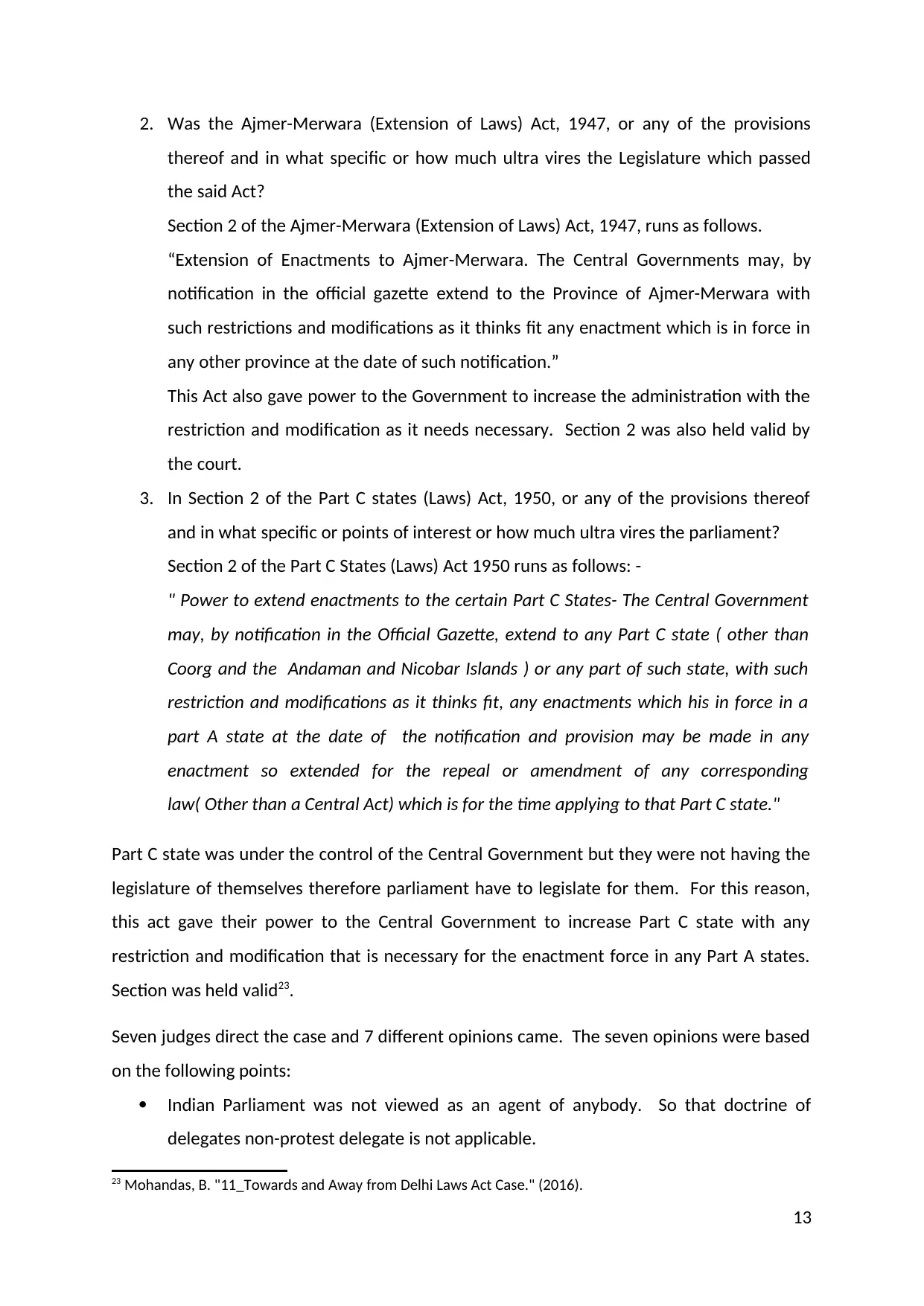
2. Was the Ajmer-Merwara (Extension of Laws) Act, 1947, or any of the provisions
thereof and in what specific or how much ultra vires the Legislature which passed
the said Act?
Section 2 of the Ajmer-Merwara (Extension of Laws) Act, 1947, runs as follows.
“Extension of Enactments to Ajmer-Merwara. The Central Governments may, by
notification in the official gazette extend to the Province of Ajmer-Merwara with
such restrictions and modifications as it thinks fit any enactment which is in force in
any other province at the date of such notification.”
This Act also gave power to the Government to increase the administration with the
restriction and modification as it needs necessary. Section 2 was also held valid by
the court.
3. In Section 2 of the Part C states (Laws) Act, 1950, or any of the provisions thereof
and in what specific or points of interest or how much ultra vires the parliament?
Section 2 of the Part C States (Laws) Act 1950 runs as follows: -
" Power to extend enactments to the certain Part C States- The Central Government
may, by notification in the Official Gazette, extend to any Part C state ( other than
Coorg and the Andaman and Nicobar Islands ) or any part of such state, with such
restriction and modifications as it thinks fit, any enactments which his in force in a
part A state at the date of the notification and provision may be made in any
enactment so extended for the repeal or amendment of any corresponding
law( Other than a Central Act) which is for the time applying to that Part C state."
Part C state was under the control of the Central Government but they were not having the
legislature of themselves therefore parliament have to legislate for them. For this reason,
this act gave their power to the Central Government to increase Part C state with any
restriction and modification that is necessary for the enactment force in any Part A states.
Section was held valid23.
Seven judges direct the case and 7 different opinions came. The seven opinions were based
on the following points:
Indian Parliament was not viewed as an agent of anybody. So that doctrine of
delegates non-protest delegate is not applicable.
23 Mohandas, B. "11_Towards and Away from Delhi Laws Act Case." (2016).
13
thereof and in what specific or how much ultra vires the Legislature which passed
the said Act?
Section 2 of the Ajmer-Merwara (Extension of Laws) Act, 1947, runs as follows.
“Extension of Enactments to Ajmer-Merwara. The Central Governments may, by
notification in the official gazette extend to the Province of Ajmer-Merwara with
such restrictions and modifications as it thinks fit any enactment which is in force in
any other province at the date of such notification.”
This Act also gave power to the Government to increase the administration with the
restriction and modification as it needs necessary. Section 2 was also held valid by
the court.
3. In Section 2 of the Part C states (Laws) Act, 1950, or any of the provisions thereof
and in what specific or points of interest or how much ultra vires the parliament?
Section 2 of the Part C States (Laws) Act 1950 runs as follows: -
" Power to extend enactments to the certain Part C States- The Central Government
may, by notification in the Official Gazette, extend to any Part C state ( other than
Coorg and the Andaman and Nicobar Islands ) or any part of such state, with such
restriction and modifications as it thinks fit, any enactments which his in force in a
part A state at the date of the notification and provision may be made in any
enactment so extended for the repeal or amendment of any corresponding
law( Other than a Central Act) which is for the time applying to that Part C state."
Part C state was under the control of the Central Government but they were not having the
legislature of themselves therefore parliament have to legislate for them. For this reason,
this act gave their power to the Central Government to increase Part C state with any
restriction and modification that is necessary for the enactment force in any Part A states.
Section was held valid23.
Seven judges direct the case and 7 different opinions came. The seven opinions were based
on the following points:
Indian Parliament was not viewed as an agent of anybody. So that doctrine of
delegates non-protest delegate is not applicable.
23 Mohandas, B. "11_Towards and Away from Delhi Laws Act Case." (2016).
13
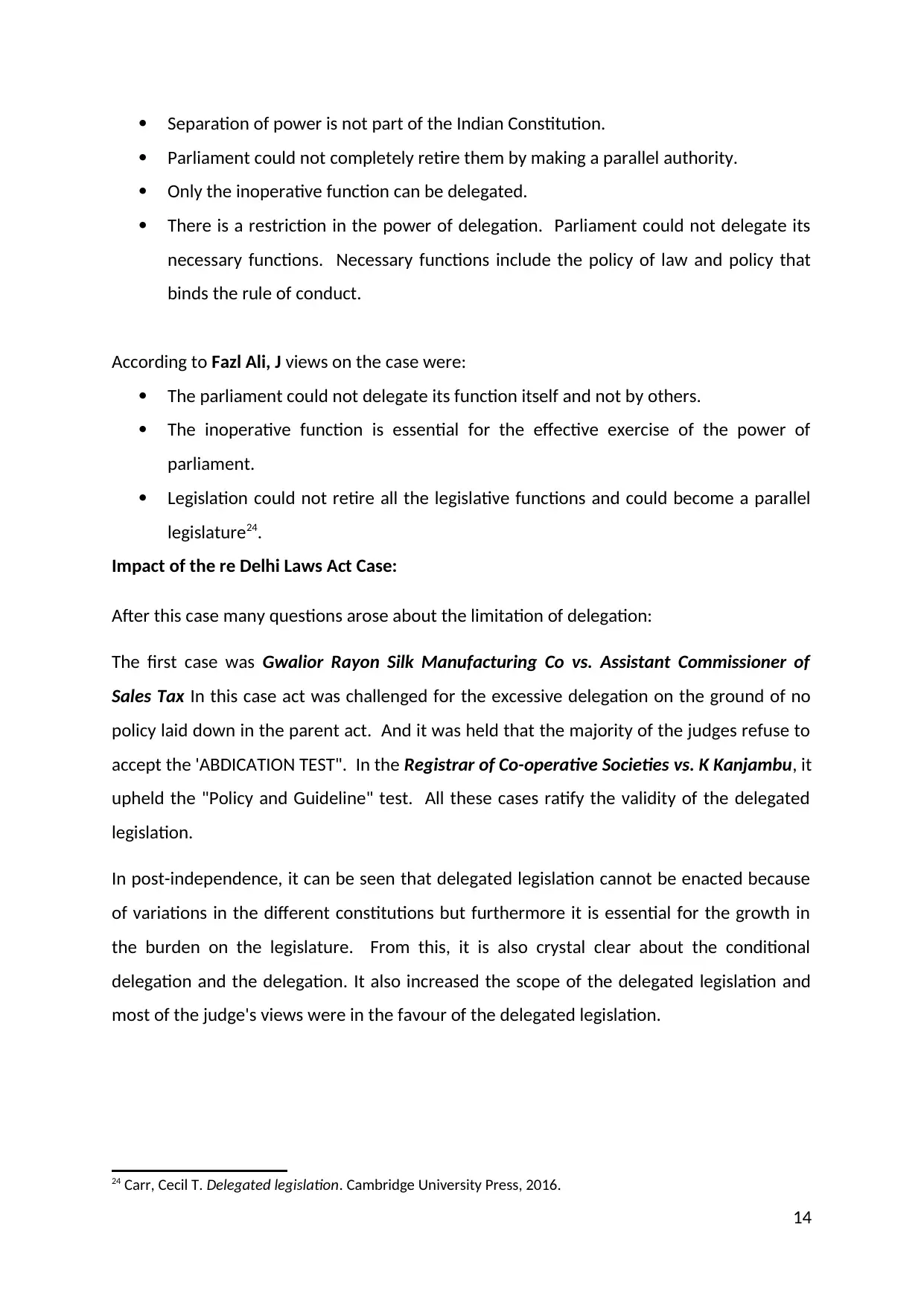
Separation of power is not part of the Indian Constitution.
Parliament could not completely retire them by making a parallel authority.
Only the inoperative function can be delegated.
There is a restriction in the power of delegation. Parliament could not delegate its
necessary functions. Necessary functions include the policy of law and policy that
binds the rule of conduct.
According to Fazl Ali, J views on the case were:
The parliament could not delegate its function itself and not by others.
The inoperative function is essential for the effective exercise of the power of
parliament.
Legislation could not retire all the legislative functions and could become a parallel
legislature24.
Impact of the re Delhi Laws Act Case:
After this case many questions arose about the limitation of delegation:
The first case was Gwalior Rayon Silk Manufacturing Co vs. Assistant Commissioner of
Sales Tax In this case act was challenged for the excessive delegation on the ground of no
policy laid down in the parent act. And it was held that the majority of the judges refuse to
accept the 'ABDICATION TEST". In the Registrar of Co-operative Societies vs. K Kanjambu, it
upheld the "Policy and Guideline" test. All these cases ratify the validity of the delegated
legislation.
In post-independence, it can be seen that delegated legislation cannot be enacted because
of variations in the different constitutions but furthermore it is essential for the growth in
the burden on the legislature. From this, it is also crystal clear about the conditional
delegation and the delegation. It also increased the scope of the delegated legislation and
most of the judge's views were in the favour of the delegated legislation.
24 Carr, Cecil T. Delegated legislation. Cambridge University Press, 2016.
14
Parliament could not completely retire them by making a parallel authority.
Only the inoperative function can be delegated.
There is a restriction in the power of delegation. Parliament could not delegate its
necessary functions. Necessary functions include the policy of law and policy that
binds the rule of conduct.
According to Fazl Ali, J views on the case were:
The parliament could not delegate its function itself and not by others.
The inoperative function is essential for the effective exercise of the power of
parliament.
Legislation could not retire all the legislative functions and could become a parallel
legislature24.
Impact of the re Delhi Laws Act Case:
After this case many questions arose about the limitation of delegation:
The first case was Gwalior Rayon Silk Manufacturing Co vs. Assistant Commissioner of
Sales Tax In this case act was challenged for the excessive delegation on the ground of no
policy laid down in the parent act. And it was held that the majority of the judges refuse to
accept the 'ABDICATION TEST". In the Registrar of Co-operative Societies vs. K Kanjambu, it
upheld the "Policy and Guideline" test. All these cases ratify the validity of the delegated
legislation.
In post-independence, it can be seen that delegated legislation cannot be enacted because
of variations in the different constitutions but furthermore it is essential for the growth in
the burden on the legislature. From this, it is also crystal clear about the conditional
delegation and the delegation. It also increased the scope of the delegated legislation and
most of the judge's views were in the favour of the delegated legislation.
24 Carr, Cecil T. Delegated legislation. Cambridge University Press, 2016.
14
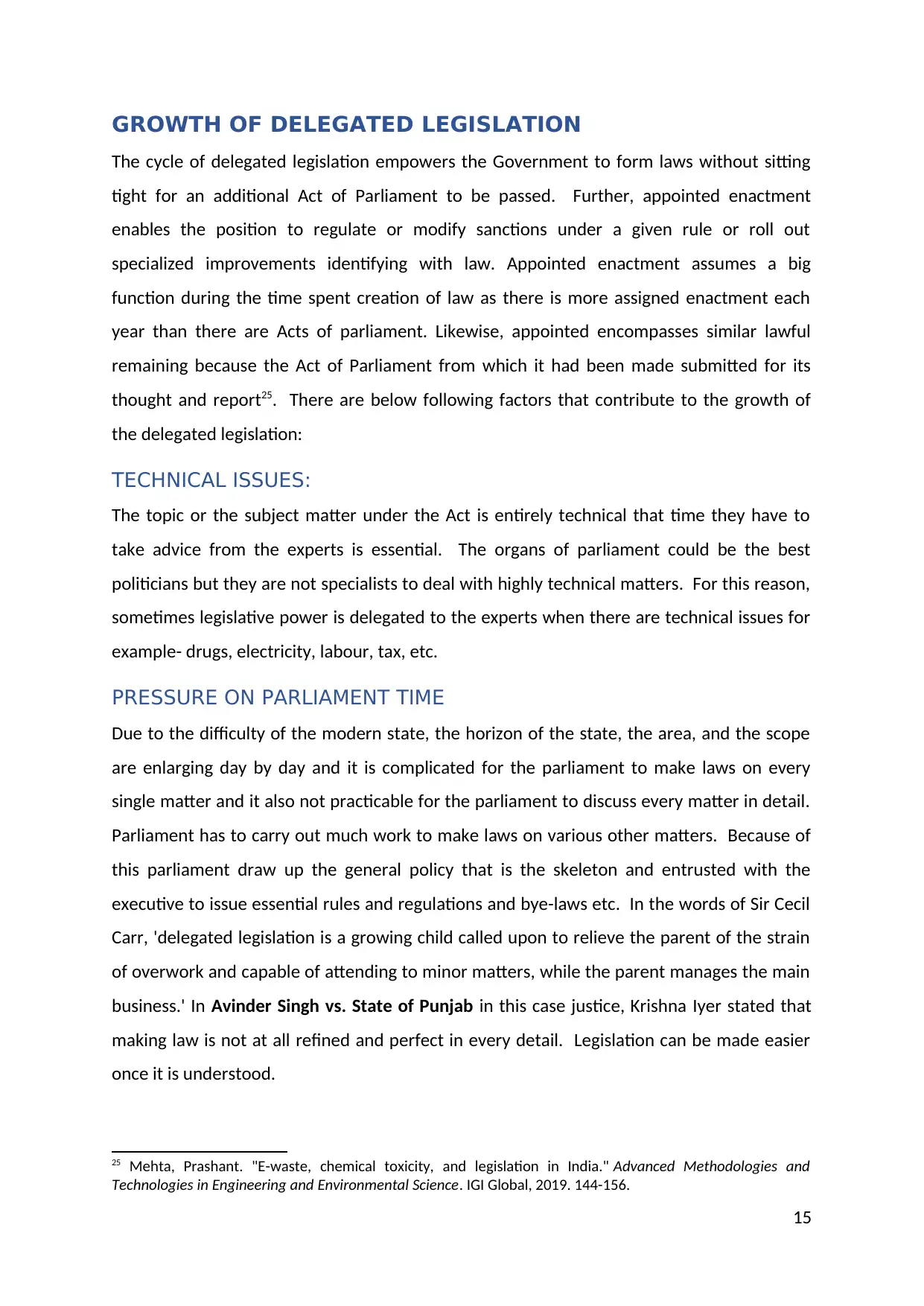
GROWTH OF DELEGATED LEGISLATION
The cycle of delegated legislation empowers the Government to form laws without sitting
tight for an additional Act of Parliament to be passed. Further, appointed enactment
enables the position to regulate or modify sanctions under a given rule or roll out
specialized improvements identifying with law. Appointed enactment assumes a big
function during the time spent creation of law as there is more assigned enactment each
year than there are Acts of parliament. Likewise, appointed encompasses similar lawful
remaining because the Act of Parliament from which it had been made submitted for its
thought and report25. There are below following factors that contribute to the growth of
the delegated legislation:
TECHNICAL ISSUES:
The topic or the subject matter under the Act is entirely technical that time they have to
take advice from the experts is essential. The organs of parliament could be the best
politicians but they are not specialists to deal with highly technical matters. For this reason,
sometimes legislative power is delegated to the experts when there are technical issues for
example- drugs, electricity, labour, tax, etc.
PRESSURE ON PARLIAMENT TIME
Due to the difficulty of the modern state, the horizon of the state, the area, and the scope
are enlarging day by day and it is complicated for the parliament to make laws on every
single matter and it also not practicable for the parliament to discuss every matter in detail.
Parliament has to carry out much work to make laws on various other matters. Because of
this parliament draw up the general policy that is the skeleton and entrusted with the
executive to issue essential rules and regulations and bye-laws etc. In the words of Sir Cecil
Carr, 'delegated legislation is a growing child called upon to relieve the parent of the strain
of overwork and capable of attending to minor matters, while the parent manages the main
business.' In Avinder Singh vs. State of Punjab in this case justice, Krishna Iyer stated that
making law is not at all refined and perfect in every detail. Legislation can be made easier
once it is understood.
25 Mehta, Prashant. "E-waste, chemical toxicity, and legislation in India." Advanced Methodologies and
Technologies in Engineering and Environmental Science. IGI Global, 2019. 144-156.
15
The cycle of delegated legislation empowers the Government to form laws without sitting
tight for an additional Act of Parliament to be passed. Further, appointed enactment
enables the position to regulate or modify sanctions under a given rule or roll out
specialized improvements identifying with law. Appointed enactment assumes a big
function during the time spent creation of law as there is more assigned enactment each
year than there are Acts of parliament. Likewise, appointed encompasses similar lawful
remaining because the Act of Parliament from which it had been made submitted for its
thought and report25. There are below following factors that contribute to the growth of
the delegated legislation:
TECHNICAL ISSUES:
The topic or the subject matter under the Act is entirely technical that time they have to
take advice from the experts is essential. The organs of parliament could be the best
politicians but they are not specialists to deal with highly technical matters. For this reason,
sometimes legislative power is delegated to the experts when there are technical issues for
example- drugs, electricity, labour, tax, etc.
PRESSURE ON PARLIAMENT TIME
Due to the difficulty of the modern state, the horizon of the state, the area, and the scope
are enlarging day by day and it is complicated for the parliament to make laws on every
single matter and it also not practicable for the parliament to discuss every matter in detail.
Parliament has to carry out much work to make laws on various other matters. Because of
this parliament draw up the general policy that is the skeleton and entrusted with the
executive to issue essential rules and regulations and bye-laws etc. In the words of Sir Cecil
Carr, 'delegated legislation is a growing child called upon to relieve the parent of the strain
of overwork and capable of attending to minor matters, while the parent manages the main
business.' In Avinder Singh vs. State of Punjab in this case justice, Krishna Iyer stated that
making law is not at all refined and perfect in every detail. Legislation can be made easier
once it is understood.
25 Mehta, Prashant. "E-waste, chemical toxicity, and legislation in India." Advanced Methodologies and
Technologies in Engineering and Environmental Science. IGI Global, 2019. 144-156.
15
Secure Best Marks with AI Grader
Need help grading? Try our AI Grader for instant feedback on your assignments.
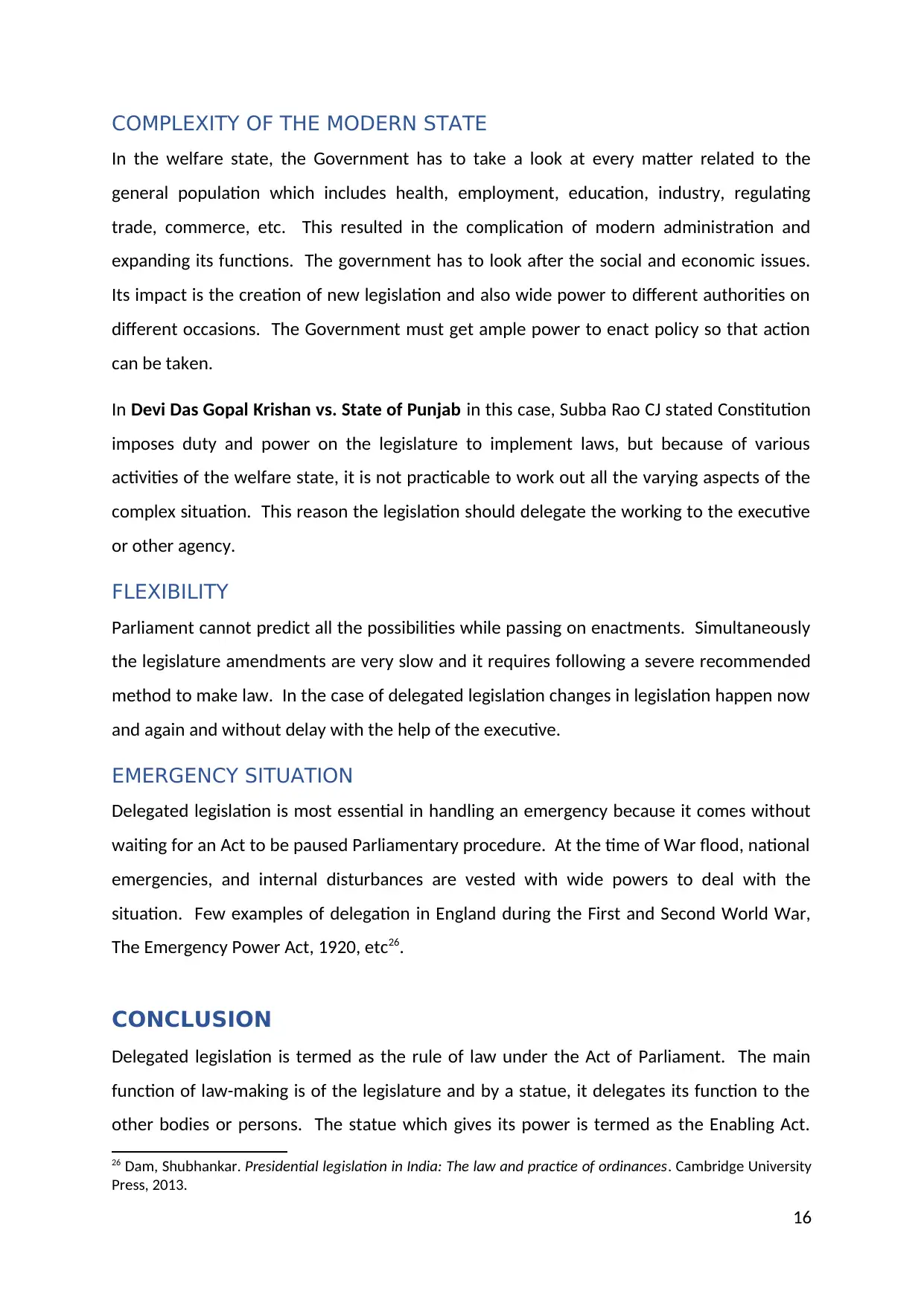
COMPLEXITY OF THE MODERN STATE
In the welfare state, the Government has to take a look at every matter related to the
general population which includes health, employment, education, industry, regulating
trade, commerce, etc. This resulted in the complication of modern administration and
expanding its functions. The government has to look after the social and economic issues.
Its impact is the creation of new legislation and also wide power to different authorities on
different occasions. The Government must get ample power to enact policy so that action
can be taken.
In Devi Das Gopal Krishan vs. State of Punjab in this case, Subba Rao CJ stated Constitution
imposes duty and power on the legislature to implement laws, but because of various
activities of the welfare state, it is not practicable to work out all the varying aspects of the
complex situation. This reason the legislation should delegate the working to the executive
or other agency.
FLEXIBILITY
Parliament cannot predict all the possibilities while passing on enactments. Simultaneously
the legislature amendments are very slow and it requires following a severe recommended
method to make law. In the case of delegated legislation changes in legislation happen now
and again and without delay with the help of the executive.
EMERGENCY SITUATION
Delegated legislation is most essential in handling an emergency because it comes without
waiting for an Act to be paused Parliamentary procedure. At the time of War flood, national
emergencies, and internal disturbances are vested with wide powers to deal with the
situation. Few examples of delegation in England during the First and Second World War,
The Emergency Power Act, 1920, etc26.
CONCLUSION
Delegated legislation is termed as the rule of law under the Act of Parliament. The main
function of law-making is of the legislature and by a statue, it delegates its function to the
other bodies or persons. The statue which gives its power is termed as the Enabling Act.
26 Dam, Shubhankar. Presidential legislation in India: The law and practice of ordinances. Cambridge University
Press, 2013.
16
In the welfare state, the Government has to take a look at every matter related to the
general population which includes health, employment, education, industry, regulating
trade, commerce, etc. This resulted in the complication of modern administration and
expanding its functions. The government has to look after the social and economic issues.
Its impact is the creation of new legislation and also wide power to different authorities on
different occasions. The Government must get ample power to enact policy so that action
can be taken.
In Devi Das Gopal Krishan vs. State of Punjab in this case, Subba Rao CJ stated Constitution
imposes duty and power on the legislature to implement laws, but because of various
activities of the welfare state, it is not practicable to work out all the varying aspects of the
complex situation. This reason the legislation should delegate the working to the executive
or other agency.
FLEXIBILITY
Parliament cannot predict all the possibilities while passing on enactments. Simultaneously
the legislature amendments are very slow and it requires following a severe recommended
method to make law. In the case of delegated legislation changes in legislation happen now
and again and without delay with the help of the executive.
EMERGENCY SITUATION
Delegated legislation is most essential in handling an emergency because it comes without
waiting for an Act to be paused Parliamentary procedure. At the time of War flood, national
emergencies, and internal disturbances are vested with wide powers to deal with the
situation. Few examples of delegation in England during the First and Second World War,
The Emergency Power Act, 1920, etc26.
CONCLUSION
Delegated legislation is termed as the rule of law under the Act of Parliament. The main
function of law-making is of the legislature and by a statue, it delegates its function to the
other bodies or persons. The statue which gives its power is termed as the Enabling Act.
26 Dam, Shubhankar. Presidential legislation in India: The law and practice of ordinances. Cambridge University
Press, 2013.
16
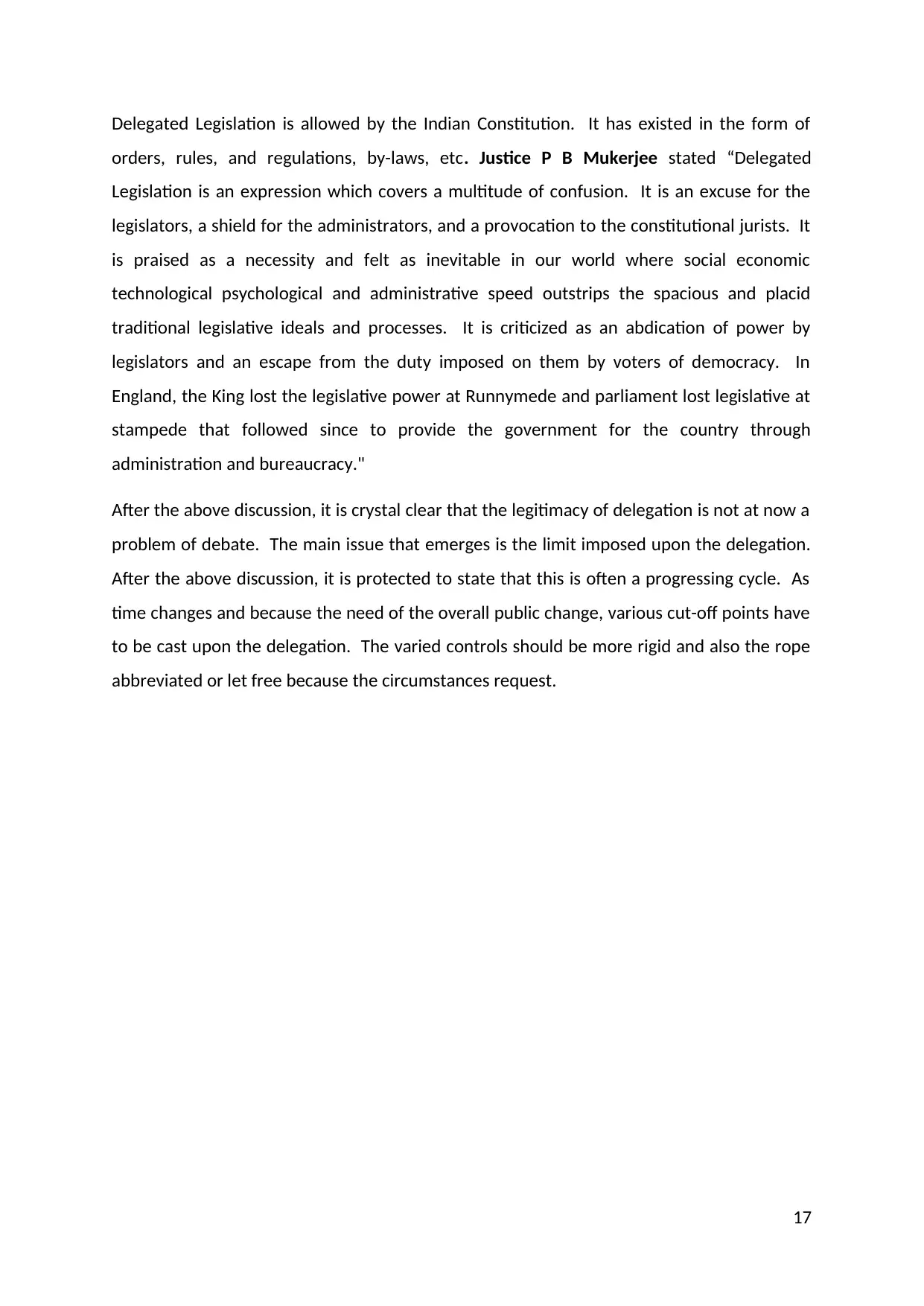
Delegated Legislation is allowed by the Indian Constitution. It has existed in the form of
orders, rules, and regulations, by-laws, etc. Justice P B Mukerjee stated “Delegated
Legislation is an expression which covers a multitude of confusion. It is an excuse for the
legislators, a shield for the administrators, and a provocation to the constitutional jurists. It
is praised as a necessity and felt as inevitable in our world where social economic
technological psychological and administrative speed outstrips the spacious and placid
traditional legislative ideals and processes. It is criticized as an abdication of power by
legislators and an escape from the duty imposed on them by voters of democracy. In
England, the King lost the legislative power at Runnymede and parliament lost legislative at
stampede that followed since to provide the government for the country through
administration and bureaucracy."
After the above discussion, it is crystal clear that the legitimacy of delegation is not at now a
problem of debate. The main issue that emerges is the limit imposed upon the delegation.
After the above discussion, it is protected to state that this is often a progressing cycle. As
time changes and because the need of the overall public change, various cut-off points have
to be cast upon the delegation. The varied controls should be more rigid and also the rope
abbreviated or let free because the circumstances request.
17
orders, rules, and regulations, by-laws, etc. Justice P B Mukerjee stated “Delegated
Legislation is an expression which covers a multitude of confusion. It is an excuse for the
legislators, a shield for the administrators, and a provocation to the constitutional jurists. It
is praised as a necessity and felt as inevitable in our world where social economic
technological psychological and administrative speed outstrips the spacious and placid
traditional legislative ideals and processes. It is criticized as an abdication of power by
legislators and an escape from the duty imposed on them by voters of democracy. In
England, the King lost the legislative power at Runnymede and parliament lost legislative at
stampede that followed since to provide the government for the country through
administration and bureaucracy."
After the above discussion, it is crystal clear that the legitimacy of delegation is not at now a
problem of debate. The main issue that emerges is the limit imposed upon the delegation.
After the above discussion, it is protected to state that this is often a progressing cycle. As
time changes and because the need of the overall public change, various cut-off points have
to be cast upon the delegation. The varied controls should be more rigid and also the rope
abbreviated or let free because the circumstances request.
17
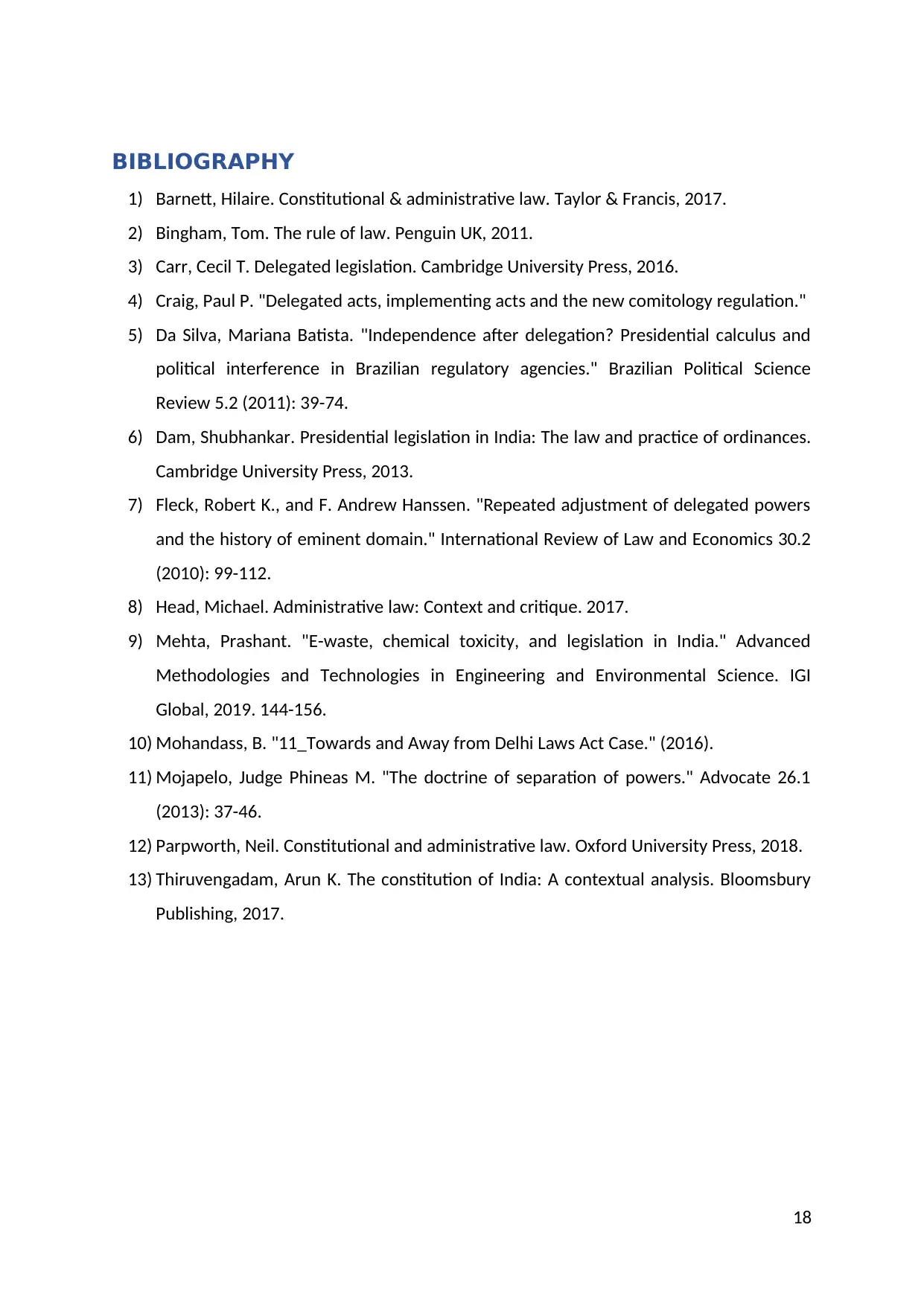
BIBLIOGRAPHY
1) Barnett, Hilaire. Constitutional & administrative law. Taylor & Francis, 2017.
2) Bingham, Tom. The rule of law. Penguin UK, 2011.
3) Carr, Cecil T. Delegated legislation. Cambridge University Press, 2016.
4) Craig, Paul P. "Delegated acts, implementing acts and the new comitology regulation."
5) Da Silva, Mariana Batista. "Independence after delegation? Presidential calculus and
political interference in Brazilian regulatory agencies." Brazilian Political Science
Review 5.2 (2011): 39-74.
6) Dam, Shubhankar. Presidential legislation in India: The law and practice of ordinances.
Cambridge University Press, 2013.
7) Fleck, Robert K., and F. Andrew Hanssen. "Repeated adjustment of delegated powers
and the history of eminent domain." International Review of Law and Economics 30.2
(2010): 99-112.
8) Head, Michael. Administrative law: Context and critique. 2017.
9) Mehta, Prashant. "E-waste, chemical toxicity, and legislation in India." Advanced
Methodologies and Technologies in Engineering and Environmental Science. IGI
Global, 2019. 144-156.
10) Mohandass, B. "11_Towards and Away from Delhi Laws Act Case." (2016).
11) Mojapelo, Judge Phineas M. "The doctrine of separation of powers." Advocate 26.1
(2013): 37-46.
12) Parpworth, Neil. Constitutional and administrative law. Oxford University Press, 2018.
13) Thiruvengadam, Arun K. The constitution of India: A contextual analysis. Bloomsbury
Publishing, 2017.
18
1) Barnett, Hilaire. Constitutional & administrative law. Taylor & Francis, 2017.
2) Bingham, Tom. The rule of law. Penguin UK, 2011.
3) Carr, Cecil T. Delegated legislation. Cambridge University Press, 2016.
4) Craig, Paul P. "Delegated acts, implementing acts and the new comitology regulation."
5) Da Silva, Mariana Batista. "Independence after delegation? Presidential calculus and
political interference in Brazilian regulatory agencies." Brazilian Political Science
Review 5.2 (2011): 39-74.
6) Dam, Shubhankar. Presidential legislation in India: The law and practice of ordinances.
Cambridge University Press, 2013.
7) Fleck, Robert K., and F. Andrew Hanssen. "Repeated adjustment of delegated powers
and the history of eminent domain." International Review of Law and Economics 30.2
(2010): 99-112.
8) Head, Michael. Administrative law: Context and critique. 2017.
9) Mehta, Prashant. "E-waste, chemical toxicity, and legislation in India." Advanced
Methodologies and Technologies in Engineering and Environmental Science. IGI
Global, 2019. 144-156.
10) Mohandass, B. "11_Towards and Away from Delhi Laws Act Case." (2016).
11) Mojapelo, Judge Phineas M. "The doctrine of separation of powers." Advocate 26.1
(2013): 37-46.
12) Parpworth, Neil. Constitutional and administrative law. Oxford University Press, 2018.
13) Thiruvengadam, Arun K. The constitution of India: A contextual analysis. Bloomsbury
Publishing, 2017.
18
1 out of 19
Related Documents
Your All-in-One AI-Powered Toolkit for Academic Success.
+13062052269
info@desklib.com
Available 24*7 on WhatsApp / Email
![[object Object]](/_next/static/media/star-bottom.7253800d.svg)
Unlock your academic potential
© 2024 | Zucol Services PVT LTD | All rights reserved.





